preparation
Environmental preparation
- IDEA
- MySQL 5.7.31
- Tomcat 8.5.64
- Maven 3.6.3
This is my environment. Don't make a big difference in the version.
Database preparation
CREATE DATABASE `ssmtest`; USE `ssmtest`; DROP TABLE IF EXISTS `user`; CREATE TABLE `user`( `userid` INT(10) NOT NULL AUTO_INCREMENT COMMENT 'user ID', `username` VARCHAR(100) NOT NULL COMMENT 'user name', `password` VARCHAR(100) NOT NULL COMMENT 'User password', `value` INT(10) NOT NULL DEFAULT 1 COMMENT 'Status, 1 normal', KEY `userid`(`userid`) ) ENGINE=INNODB DEFAULT CHARSET=utf8; INSERT INTO `user`(`userid`,`username`,`password`,`value`)VALUES (1,'keafmd','666',1), (2,'keafod','888',1);
Start working
Create a Maven project ssmtest with Web support
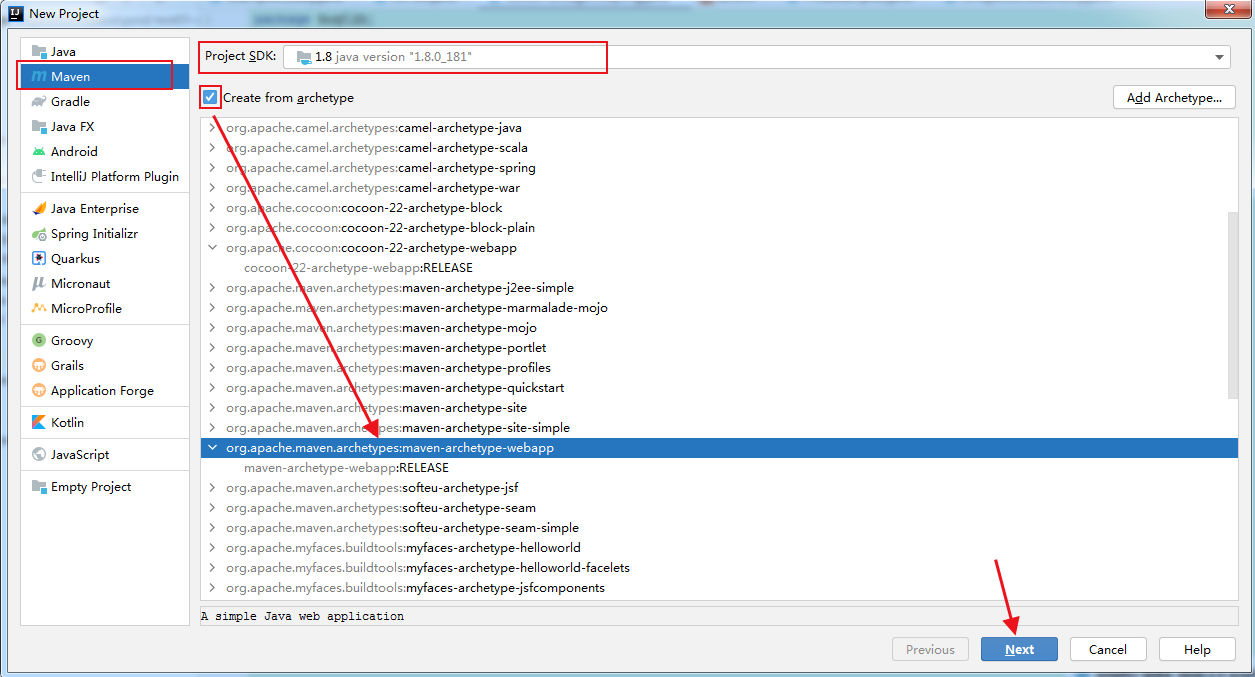
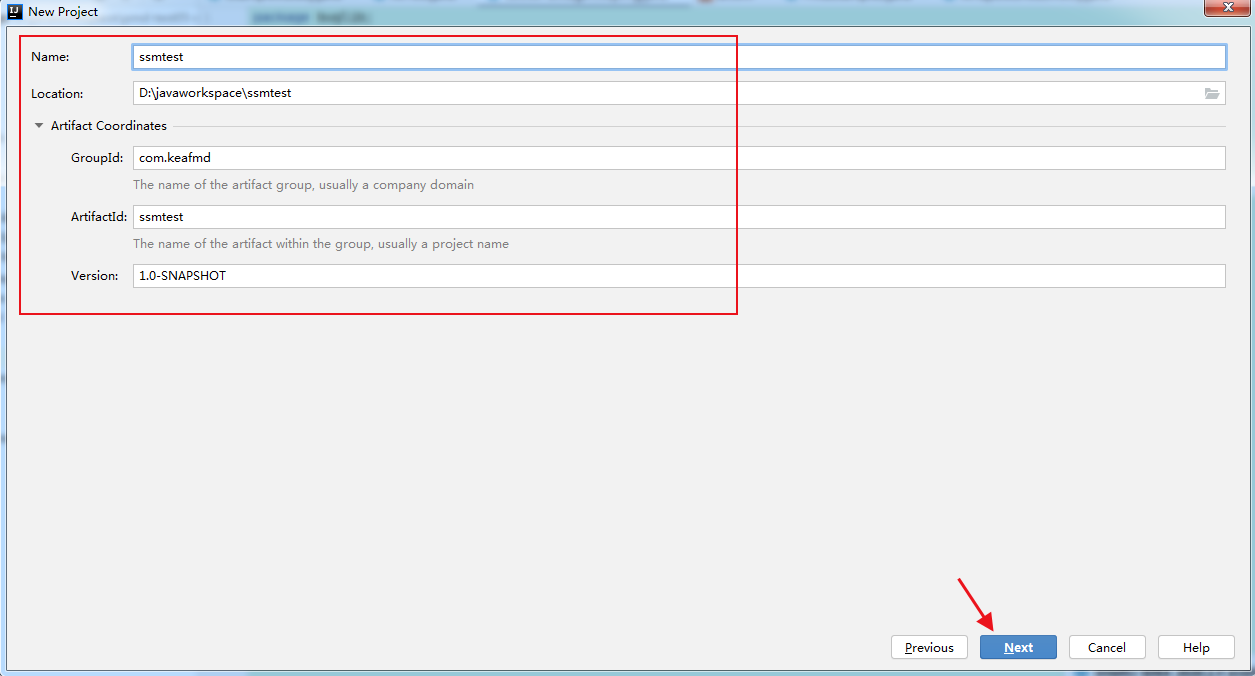
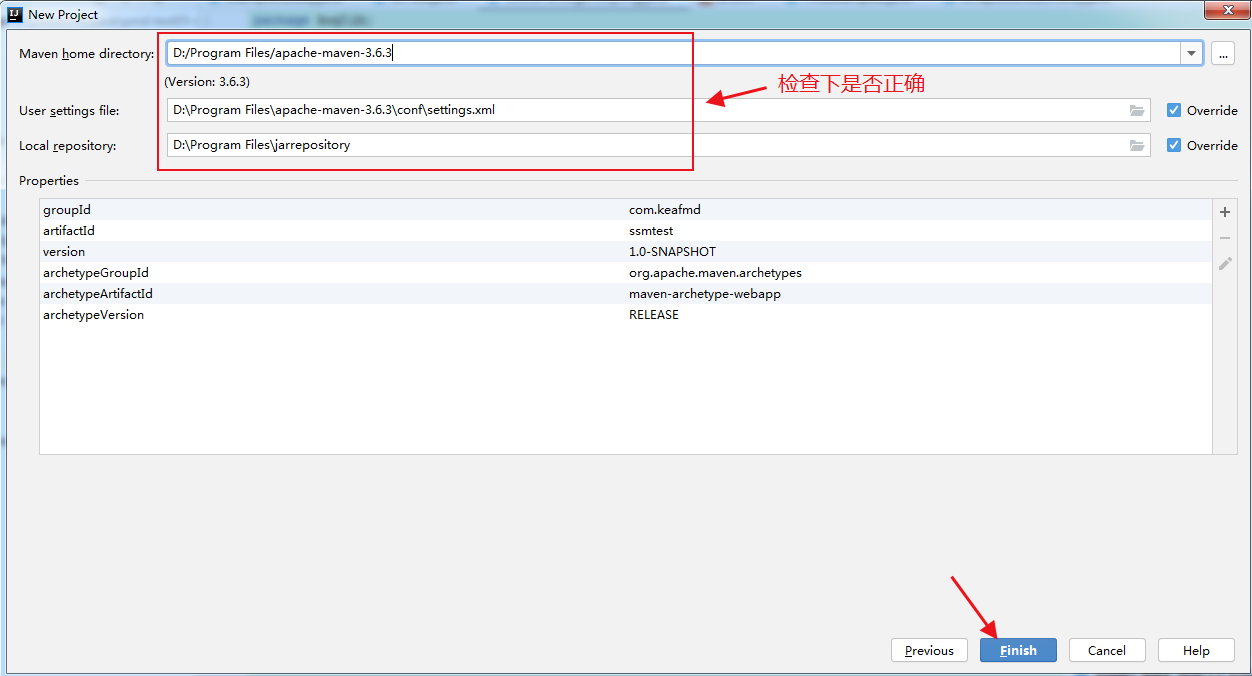
Effect of creation completion:
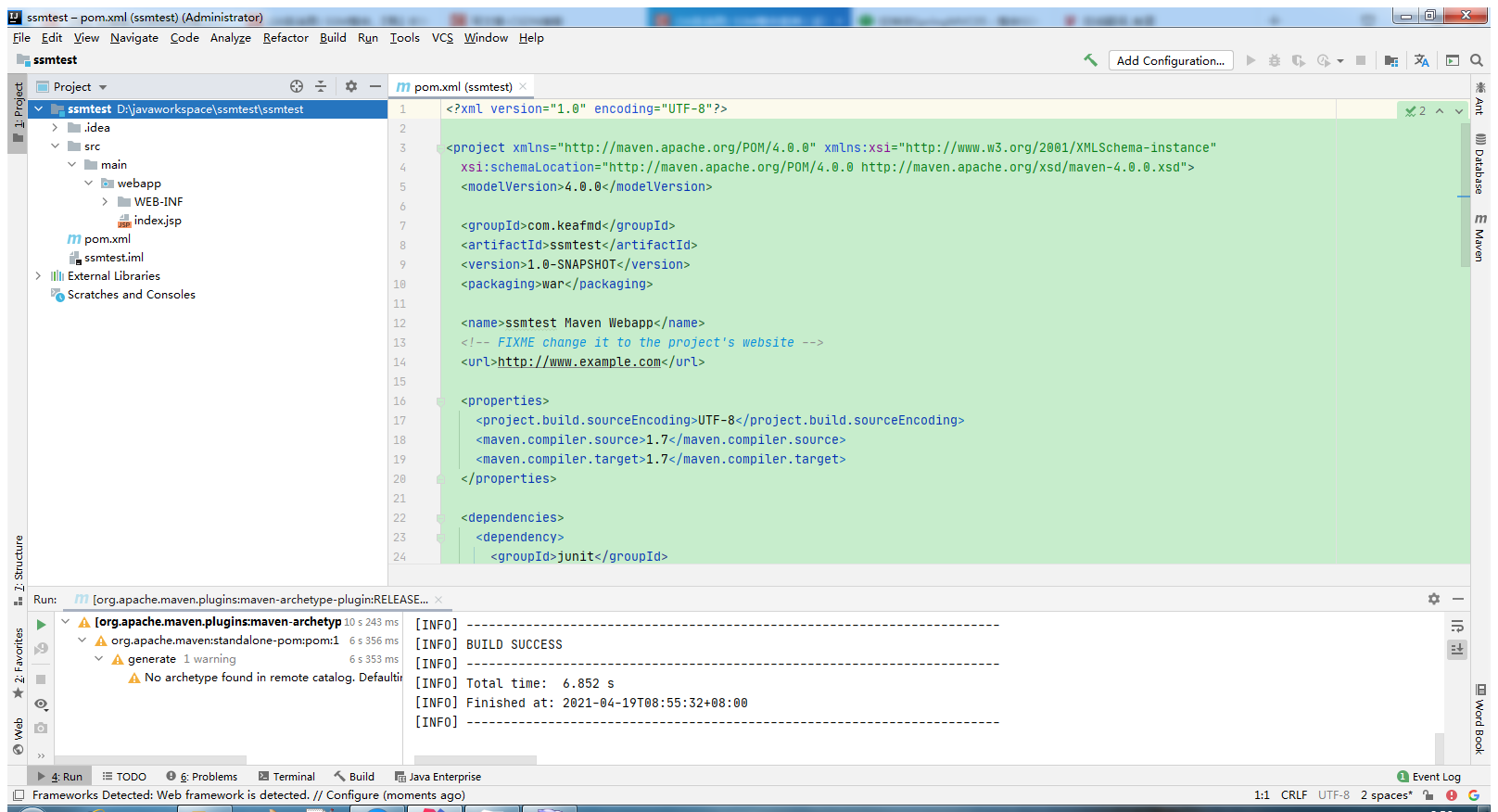
Add dependency
<properties>
<project.build.sourceEncoding>UTF-8</project.build.sourceEncoding>
<maven.compiler.source>1.8</maven.compiler.source>
<maven.compiler.target>1.8</maven.compiler.target>
<!--Unified version management-->
<spring.version>5.2.7.RELEASE</spring.version>
<slf4j.version>1.7.6</slf4j.version>
<log4j.version>1.2.12</log4j.version>
<mysql.version>5.1.49</mysql.version>
<mybatis.version>3.4.5</mybatis.version>
</properties>
<dependencies>
<!-- spring -->
<dependency>
<groupId>org.aspectj</groupId>
<artifactId>aspectjweaver</artifactId>
<version>1.9.5</version>
</dependency>
<dependency>
<groupId>org.springframework</groupId>
<artifactId>spring-aop</artifactId>
<version>${spring.version}</version>
</dependency>
<dependency>
<groupId>org.springframework</groupId>
<artifactId>spring-context</artifactId>
<version>${spring.version}</version>
</dependency>
<dependency>
<groupId>org.springframework</groupId>
<artifactId>spring-web</artifactId>
<version>${spring.version}</version>
</dependency>
<dependency>
<groupId>org.springframework</groupId>
<artifactId>spring-webmvc</artifactId>
<version>${spring.version}</version>
</dependency>
<dependency>
<groupId>org.springframework</groupId>
<artifactId>spring-test</artifactId>
<version>${spring.version}</version>
</dependency>
<dependency>
<groupId>org.springframework</groupId>
<artifactId>spring-tx</artifactId>
<version>${spring.version}</version>
</dependency>
<dependency>
<groupId>org.springframework</groupId>
<artifactId>spring-jdbc</artifactId>
<version>${spring.version}</version>
</dependency>
<!--Junit-->
<dependency>
<groupId>junit</groupId>
<artifactId>junit</artifactId>
<version>4.12</version>
<scope>compile</scope>
</dependency>
<!--Database driven-->
<dependency>
<groupId>mysql</groupId>
<artifactId>mysql-connector-java</artifactId>
<version>${mysql.version}</version>
</dependency>
<!-- Database connection pool -->
<dependency>
<groupId>c3p0</groupId>
<artifactId>c3p0</artifactId>
<version>0.9.1.1</version>
<type>jar</type>
<scope>compile</scope>
</dependency>
<!--Servlet - JSP -->
<dependency>
<groupId>javax.servlet</groupId>
<artifactId>servlet-api</artifactId>
<version>2.5</version>
<scope>provided</scope>
</dependency>
<dependency>
<groupId>javax.servlet.jsp</groupId>
<artifactId>jsp-api</artifactId>
<version>2.0</version>
<scope>provided</scope>
</dependency>
<dependency>
<groupId>jstl</groupId>
<artifactId>jstl</artifactId>
<version>1.2</version>
</dependency>
<!--Mybatis-->
<dependency>
<groupId>org.mybatis</groupId>
<artifactId>mybatis</artifactId>
<version>${mybatis.version}</version>
</dependency>
<dependency>
<groupId>org.mybatis</groupId>
<artifactId>mybatis-spring</artifactId>
<version>1.3.2</version>
</dependency>
<!-- log -->
<dependency>
<groupId>log4j</groupId>
<artifactId>log4j</artifactId>
<version>${log4j.version}</version>
</dependency>
<dependency>
<groupId>org.slf4j</groupId>
<artifactId>slf4j-api</artifactId>
<version>${slf4j.version}</version>
</dependency>
<dependency>
<groupId>org.slf4j</groupId>
<artifactId>slf4j-log4j12</artifactId>
<version>${slf4j.version}</version>
</dependency>
</dependencies>
Complete POM xml
<?xml version="1.0" encoding="UTF-8"?>
<project xmlns="http://maven.apache.org/POM/4.0.0" xmlns:xsi="http://www.w3.org/2001/XMLSchema-instance"
xsi:schemaLocation="http://maven.apache.org/POM/4.0.0 http://maven.apache.org/xsd/maven-4.0.0.xsd">
<modelVersion>4.0.0</modelVersion>
<groupId>com.keafmd</groupId>
<artifactId>ssmtest</artifactId>
<version>1.0-SNAPSHOT</version>
<packaging>war</packaging>
<name>ssmtest Maven Webapp</name>
<!-- FIXME change it to the project's website -->
<url>http://www.example.com</url>
<properties>
<project.build.sourceEncoding>UTF-8</project.build.sourceEncoding>
<maven.compiler.source>1.8</maven.compiler.source>
<maven.compiler.target>1.8</maven.compiler.target>
<!--Unified version management-->
<spring.version>5.2.7.RELEASE</spring.version>
<slf4j.version>1.7.6</slf4j.version>
<log4j.version>1.2.12</log4j.version>
<mysql.version>5.1.49</mysql.version>
<mybatis.version>3.4.5</mybatis.version>
</properties>
<dependencies>
<!-- spring -->
<dependency>
<groupId>org.aspectj</groupId>
<artifactId>aspectjweaver</artifactId>
<version>1.9.5</version>
</dependency>
<dependency>
<groupId>org.springframework</groupId>
<artifactId>spring-aop</artifactId>
<version>${spring.version}</version>
</dependency>
<dependency>
<groupId>org.springframework</groupId>
<artifactId>spring-context</artifactId>
<version>${spring.version}</version>
</dependency>
<dependency>
<groupId>org.springframework</groupId>
<artifactId>spring-web</artifactId>
<version>${spring.version}</version>
</dependency>
<dependency>
<groupId>org.springframework</groupId>
<artifactId>spring-webmvc</artifactId>
<version>${spring.version}</version>
</dependency>
<dependency>
<groupId>org.springframework</groupId>
<artifactId>spring-test</artifactId>
<version>${spring.version}</version>
</dependency>
<dependency>
<groupId>org.springframework</groupId>
<artifactId>spring-tx</artifactId>
<version>${spring.version}</version>
</dependency>
<dependency>
<groupId>org.springframework</groupId>
<artifactId>spring-jdbc</artifactId>
<version>${spring.version}</version>
</dependency>
<!--Junit-->
<dependency>
<groupId>junit</groupId>
<artifactId>junit</artifactId>
<version>4.12</version>
<scope>compile</scope>
</dependency>
<!--Database driven-->
<dependency>
<groupId>mysql</groupId>
<artifactId>mysql-connector-java</artifactId>
<version>${mysql.version}</version>
</dependency>
<!-- Database connection pool -->
<dependency>
<groupId>c3p0</groupId>
<artifactId>c3p0</artifactId>
<version>0.9.1.1</version>
<type>jar</type>
<scope>compile</scope>
</dependency>
<!--Servlet - JSP -->
<dependency>
<groupId>javax.servlet</groupId>
<artifactId>servlet-api</artifactId>
<version>2.5</version>
<scope>provided</scope>
</dependency>
<dependency>
<groupId>javax.servlet.jsp</groupId>
<artifactId>jsp-api</artifactId>
<version>2.0</version>
<scope>provided</scope>
</dependency>
<dependency>
<groupId>jstl</groupId>
<artifactId>jstl</artifactId>
<version>1.2</version>
</dependency>
<!--Mybatis-->
<dependency>
<groupId>org.mybatis</groupId>
<artifactId>mybatis</artifactId>
<version>${mybatis.version}</version>
</dependency>
<dependency>
<groupId>org.mybatis</groupId>
<artifactId>mybatis-spring</artifactId>
<version>1.3.2</version>
</dependency>
<!-- log -->
<dependency>
<groupId>log4j</groupId>
<artifactId>log4j</artifactId>
<version>${log4j.version}</version>
</dependency>
<dependency>
<groupId>org.slf4j</groupId>
<artifactId>slf4j-api</artifactId>
<version>${slf4j.version}</version>
</dependency>
<dependency>
<groupId>org.slf4j</groupId>
<artifactId>slf4j-log4j12</artifactId>
<version>${slf4j.version}</version>
</dependency>
</dependencies>
<build>
<finalName>ssmtest</finalName>
<pluginManagement><!-- lock down plugins versions to avoid using Maven defaults (may be moved to parent pom) -->
<plugins>
<plugin>
<artifactId>maven-clean-plugin</artifactId>
<version>3.1.0</version>
</plugin>
<!-- see http://maven.apache.org/ref/current/maven-core/default-bindings.html#Plugin_bindings_for_war_packaging -->
<plugin>
<artifactId>maven-resources-plugin</artifactId>
<version>3.0.2</version>
</plugin>
<plugin>
<artifactId>maven-compiler-plugin</artifactId>
<version>3.8.0</version>
</plugin>
<plugin>
<artifactId>maven-surefire-plugin</artifactId>
<version>2.22.1</version>
</plugin>
<plugin>
<artifactId>maven-war-plugin</artifactId>
<version>3.2.2</version>
</plugin>
<plugin>
<artifactId>maven-install-plugin</artifactId>
<version>2.5.2</version>
</plugin>
<plugin>
<artifactId>maven-deploy-plugin</artifactId>
<version>2.8.2</version>
</plugin>
</plugins>
</pluginManagement>
</build>
</project>
Create entity, dao, service and controller packages
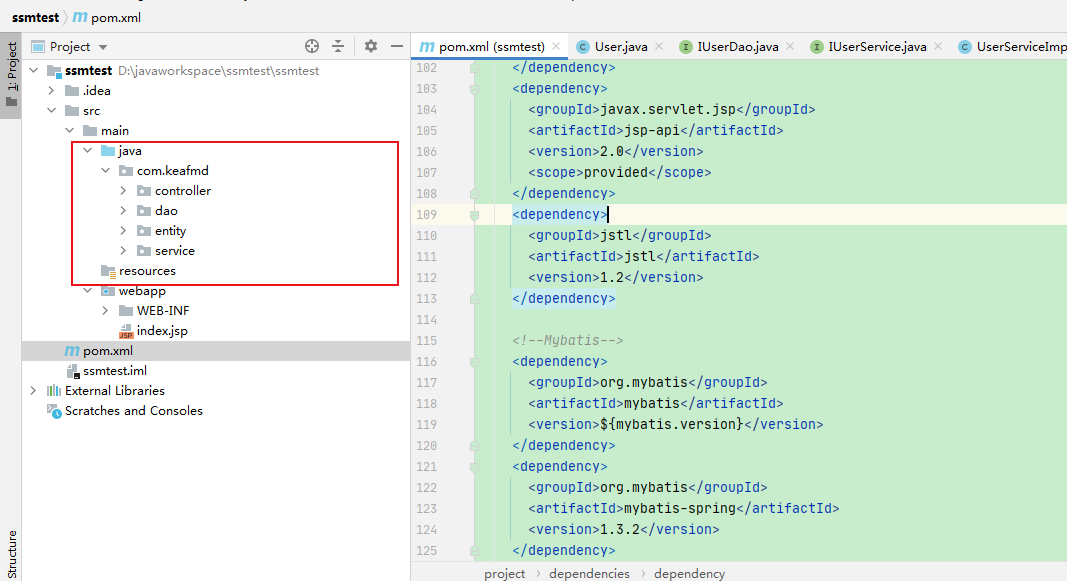
Entity class writing
Add lombook
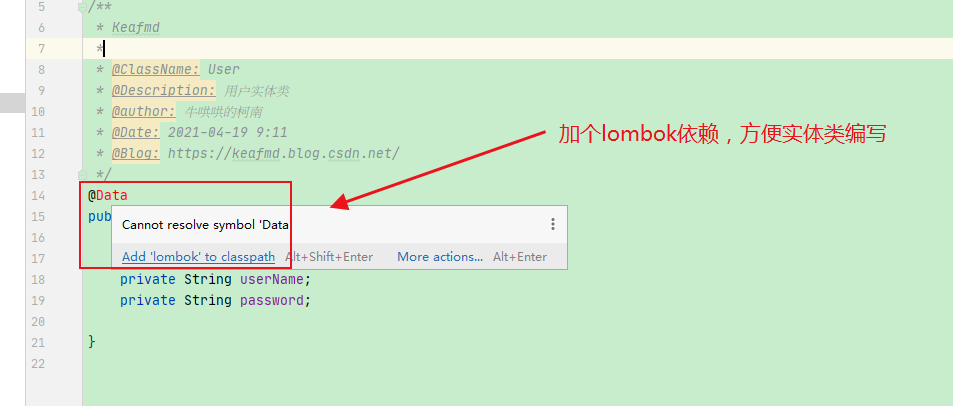
User:
package com.keafmd.entity;
import lombok.Data;
import java.io.Serializable;
/**
* Keafmd
*
* @ClassName: User
* @Description: User entity class
* @author: Coax Conan
* @Date: 2021-04-19 9:11
* @Blog: https://keafmd.blog.csdn.net/
*/
@Data
public class User implements Serializable {
private Integer userId;
private String userName;
private String password;
}
Persistence layer interface writing
IUserDao :
package com.keafmd.dao;
import com.keafmd.entity.User;
import java.util.List;
/**
* Keafmd
*
* @ClassName: IUserDao
* @Description: User dao interface
* @author: Coaxed Conan
* @Date: 2021-04-19 9:20
* @Blog: https://keafmd.blog.csdn.net/
*/
public interface IUserDao {
//Query all
public List<User> findAll();
//Save user
public void saveUser(User user);
}
Business layer interface writing
IUserService:
package com.keafmd.service;
import com.keafmd.entity.User;
import java.util.List;
/**
* Keafmd
*
* @ClassName: IUserService
* @Description: user Business layer interface
* @author: Coaxed Conan
* @Date: 2021-04-19 9:23
* @Blog: https://keafmd.blog.csdn.net/
*/
public interface IUserService {
//Query all
public List<User> findAll();
//Save user
public void saveUser(User user);
}
Business layer implementation class writing
UserServiceImpl :
package com.keafmd.service.impl;
import com.keafmd.entity.User;
import com.keafmd.service.IUserService;
import java.util.List;
/**
* Keafmd
*
* @ClassName: UserService
* @Description: user Business layer implementation class
* @author: Coaxed Conan
* @Date: 2021-04-19 9:25
* @Blog: https://keafmd.blog.csdn.net/
*/
public class UserServiceImpl implements IUserService {
@Override
public List<User> findAll() {
System.out.println("user Business layer implementation class--findAll");
return null;
}
@Override
public void saveUser(User user) {
System.out.println("user Business layer implementation class--saveUser");
}
}
Presentation layer compilation
UserController :
package com.keafmd.controller;
/**
* Keafmd
*
* @ClassName: UserController
* @Description: user Control layer
* @author: Coaxed Conan
* @Date: 2021-04-19 9:28
* @Blog: https://keafmd.blog.csdn.net/
*/
public class UserController {
}
Integration steps
Ensure that the Spring framework runs independently in the web project
Step 1: write the spring configuration file and import the constraints
applicationContext.xml:
<?xml version="1.0" encoding="UTF-8"?>
<beans xmlns="http://www.springframework.org/schema/beans"
xmlns:xsi="http://www.w3.org/2001/XMLSchema-instance"
xmlns:context="http://www.springframework.org/schema/context"
xmlns:aop="http://www.springframework.org/schema/aop" xmlns:tx="http://www.springframework.org/schema/tx"
xsi:schemaLocation="http://www.springframework.org/schema/beans
http://www.springframework.org/schema/beans/spring-beans.xsd
http://www.springframework.org/schema/context
http://www.springframework.org/schema/context/spring-context.xsd
http://www.springframework.org/schema/aop
http://www.springframework.org/schema/aop/spring-aop.xsd
http://www.springframework.org/schema/tx
http://www.springframework.org/schema/tx/spring-tx.xsd">
<!-- Start annotation scanning. What to scan is service and dao The annotation of the layer should be ignored web Layer annotation, because web Layer let SpringMVC Framework to manage -->
<context:component-scan base-package="com.keafmd">
<!-- Configure annotations to ignore -->
<context:exclude-filter type="annotation" expression="org.springframework.stereotype.Controller"/>
</context:component-scan>
</beans>
Step 2: configure the business layer with annotations
Add @ Service("userService") to the UserServiceImpl method
package com.keafmd.service.impl;
import com.keafmd.entity.User;
import com.keafmd.service.IUserService;
import org.springframework.stereotype.Service;
import java.util.List;
/**
* Keafmd
*
* @ClassName: UserService
* @Description: user Business layer implementation class
* @author: Coaxed Conan
* @Date: 2021-04-19 9:25
* @Blog: https://keafmd.blog.csdn.net/
*/
@Service("userService")
public class UserServiceImpl implements IUserService {
@Override
public List<User> findAll() {
System.out.println("user Business layer implementation class--findAll");
return null;
}
@Override
public void saveUser(User user) {
System.out.println("user Business layer implementation class--saveUser");
}
}
Step 3: import log4j Properties configuration file
# Set root category priority to INFO and its only appender to CONSOLE.
#log4j.rootCategory=INFO, CONSOLE debug info warn error fatal
log4j.rootCategory=info, CONSOLE, LOGFILE
# Set the enterprise logger category to FATAL and its only appender to CONSOLE.
log4j.logger.org.apache.axis.enterprise=FATAL, CONSOLE
# CONSOLE is set to be a ConsoleAppender using a PatternLayout.
log4j.appender.CONSOLE=org.apache.log4j.ConsoleAppender
log4j.appender.CONSOLE.layout=org.apache.log4j.PatternLayout
log4j.appender.CONSOLE.layout.ConversionPattern=%d{ISO8601} %-6r [%15.15t] %-5p %30.30c %x - %m\n
# LOGFILE is set to be a File appender using a PatternLayout.
log4j.appender.LOGFILE=org.apache.log4j.FileAppender
log4j.appender.LOGFILE.File=d:\axis.log
log4j.appender.LOGFILE.Append=true
log4j.appender.LOGFILE.layout=org.apache.log4j.PatternLayout
log4j.appender.LOGFILE.layout.ConversionPattern=%d{ISO8601} %-6r [%15.15t] %-5p %30.30c %x - %m\n
Step 4: test whether spring can run independently
Test code:
package com.keafmd;
import com.keafmd.service.IUserService;
import org.junit.Test;
import org.springframework.context.ApplicationContext;
import org.springframework.context.support.ClassPathXmlApplicationContext;
/**
* Keafmd
*
* @ClassName: TestSpring
* @Description: Test whether spring can run independently
* @author: Coaxed Conan
* @Date: 2021-04-19 9:38
* @Blog: https://keafmd.blog.csdn.net/
*/
public class TestSpring {
@Test
public void test1(){
//Load profile
ApplicationContext ac = new ClassPathXmlApplicationContext("classpath:applicationContext.xml");
//Get object
IUserService userService = (IUserService)ac.getBean("userService");
//Call method
userService.findAll();
}
}
Test effect:
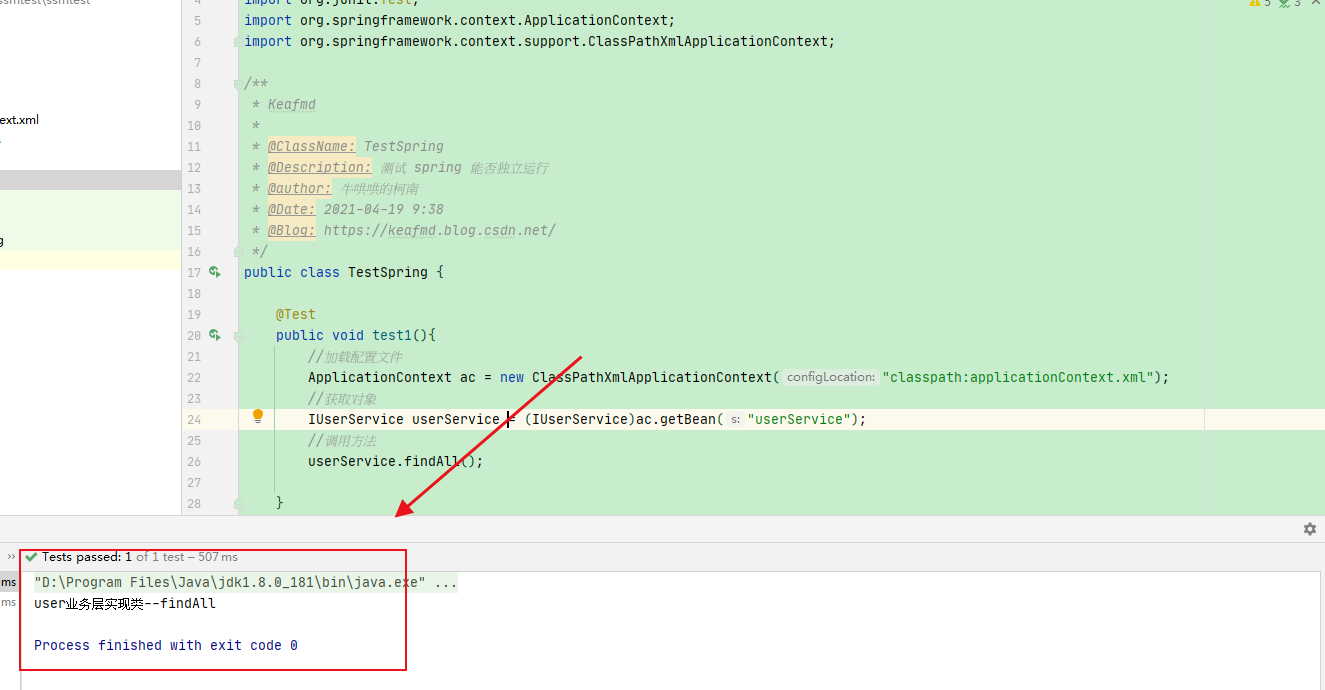
Ensure that spring MVC runs independently in web projects
Step 1: write the spring MVC configuration file
springmvc.xml:
<?xml version="1.0" encoding="UTF-8"?>
<beans xmlns="http://www.springframework.org/schema/beans"
xmlns:mvc="http://www.springframework.org/schema/mvc"
xmlns:context="http://www.springframework.org/schema/context"
xmlns:xsi="http://www.w3.org/2001/XMLSchema-instance"
xsi:schemaLocation=" http://www.springframework.org/schema/beans
http://www.springframework.org/schema/beans/spring-beans.xsd
http://www.springframework.org/schema/mvc
http://www.springframework.org/schema/mvc/spring-mvc.xsd
http://www.springframework.org/schema/context
http://www.springframework.org/schema/context/spring-context.xsd">
<!-- Enable annotation scanning controller Notes, others are not scanned -->
<context:component-scan base-package="com.keafmd">
<context:include-filter type="annotation" expression="org.springframework.stereotype.Controller"/>
</context:component-scan>
<!-- Configure view parser -->
<bean id="viewResolver"
class="org.springframework.web.servlet.view.InternalResourceViewResolver">
<!-- JSP Directory where the file is located -->
<property name="prefix" value="/WEB-INF/pages/"/>
<!-- File suffix -->
<property name="suffix" value=".jsp"/>
</bean>
<!-- Filter static resources, set static resources not to filter -->
<mvc:resources location="/css/" mapping="/css/**"/>
<mvc:resources location="/images/" mapping="/images/**"/>
<mvc:resources location="/js/" mapping="/js/**"/>
<!-- Open pair SpringMVC Annotation support -->
<mvc:annotation-driven/>
</beans>
Step 2: on the web Configure the core controller (DispatcherServlet) in XML
web.xml:
<!DOCTYPE web-app PUBLIC
"-//Sun Microsystems, Inc.//DTD Web Application 2.3//EN"
"http://java.sun.com/dtd/web-app_2_3.dtd" >
<web-app>
<display-name>Archetype Created Web Application</display-name>
<!-- Configure the front-end controller: the server must be loaded when starting, and it needs to be loaded springmvc.xml configuration file -->
<servlet>
<servlet-name>dispatcherServlet</servlet-name>
<servlet-class>org.springframework.web.servlet.DispatcherServlet</servlet-class>
<!-- Configure initialization parameters and load springmvc.xml configuration file -->
<init-param>
<param-name>contextConfigLocation</param-name>
<param-value>classpath:springmvc.xml</param-value>
</init-param>
<!-- Start the server and create the servlet -->
<load-on-startup>1</load-on-startup>
</servlet>
<servlet-mapping>
<servlet-name>dispatcherServlet</servlet-name>
<url-pattern>/</url-pattern>
</servlet-mapping>
<!--Filter for solving Chinese garbled code-->
<filter>
<filter-name>characterEncodingFilter</filter-name>
<filter-class>org.springframework.web.filter.CharacterEncodingFilter</filter-class>
<init-param>
<param-name>encoding</param-name>
<param-value>UTF-8</param-value>
</init-param>
</filter>
<filter-mapping>
<filter-name>characterEncodingFilter</filter-name>
<url-pattern>/*</url-pattern>
</filter-mapping>
</web-app>
Step 3: write Controller and jsp pages
UserController :
package com.keafmd.controller;
import org.springframework.stereotype.Controller;
import org.springframework.web.bind.annotation.RequestMapping;
/**
* Keafmd
*
* @ClassName: UserController
* @Description: user Control layer
* @author: Coaxed Conan
* @Date: 2021-04-19 9:28
* @Blog: https://keafmd.blog.csdn.net/
*/
@Controller
@RequestMapping("/user")
public class UserController {
@RequestMapping("/findAll")
public String findAll(){
System.out.println("Presentation layer--All users query");
return "user_list";
}
}
index.jsp:
<%--
Created by IntelliJ IDEA.
User: lenovo
Date: 2021/4/19
Time: 9:52
To change this template use File | Settings | File Templates.
--%>
<%@ page contentType="text/html;charset=UTF-8" language="java" %>
<html>
<head>
<title>Title</title>
</head>
<body>
<a href="user/findAll">Query all users</a>
</body>
</html>
user_list.jsp:
<%--
Created by IntelliJ IDEA.
User: lenovo
Date: 2021/4/19
Time: 9:55
To change this template use File | Settings | File Templates.
--%>
<%@ page contentType="text/html;charset=UTF-8" language="java" %>
<html>
<head>
<title>Title</title>
</head>
<body>
<h1>Query all users</h1>
</body>
</html>
Step 4: deploy tomcat server
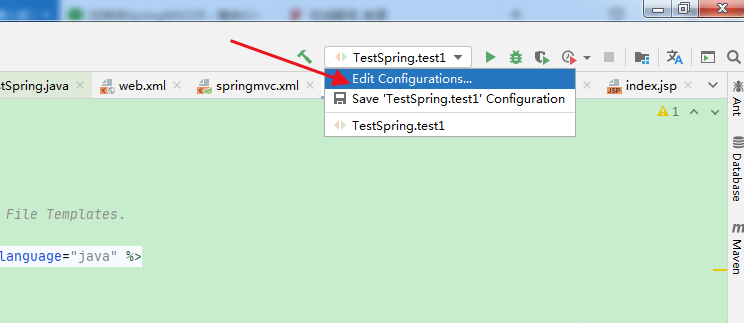
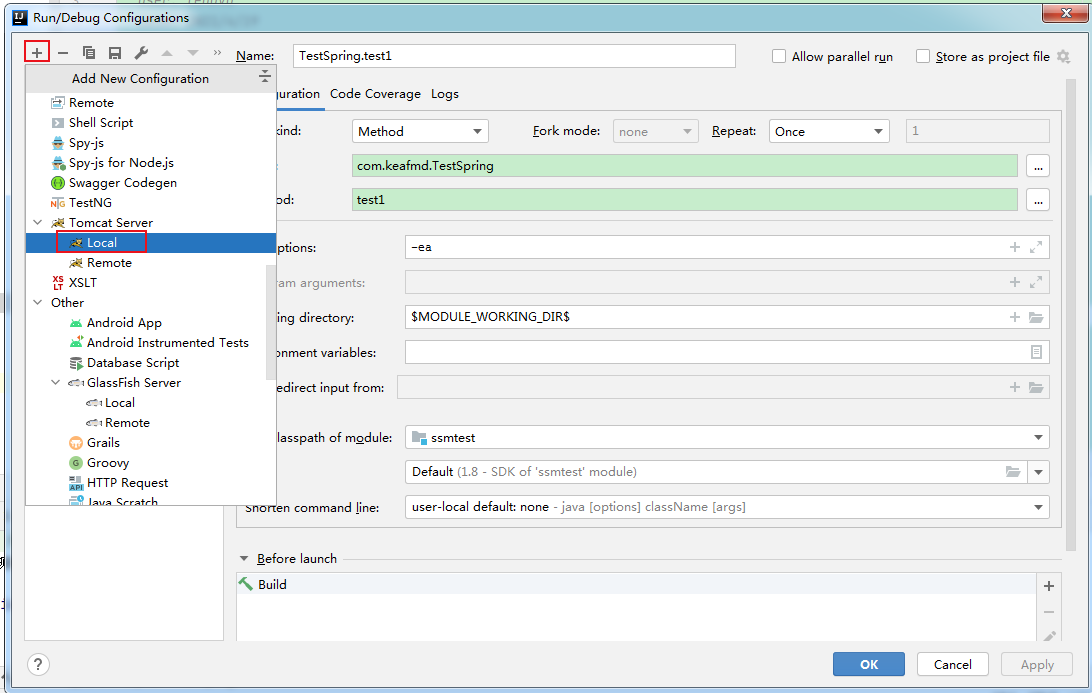
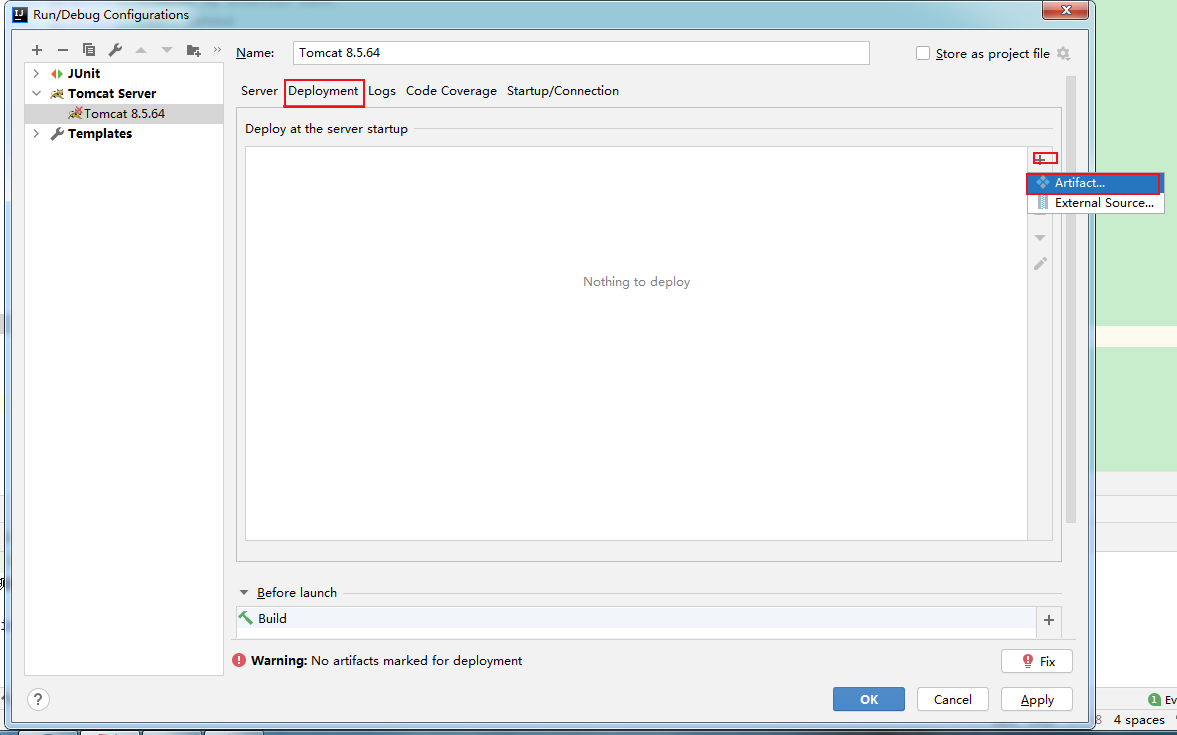
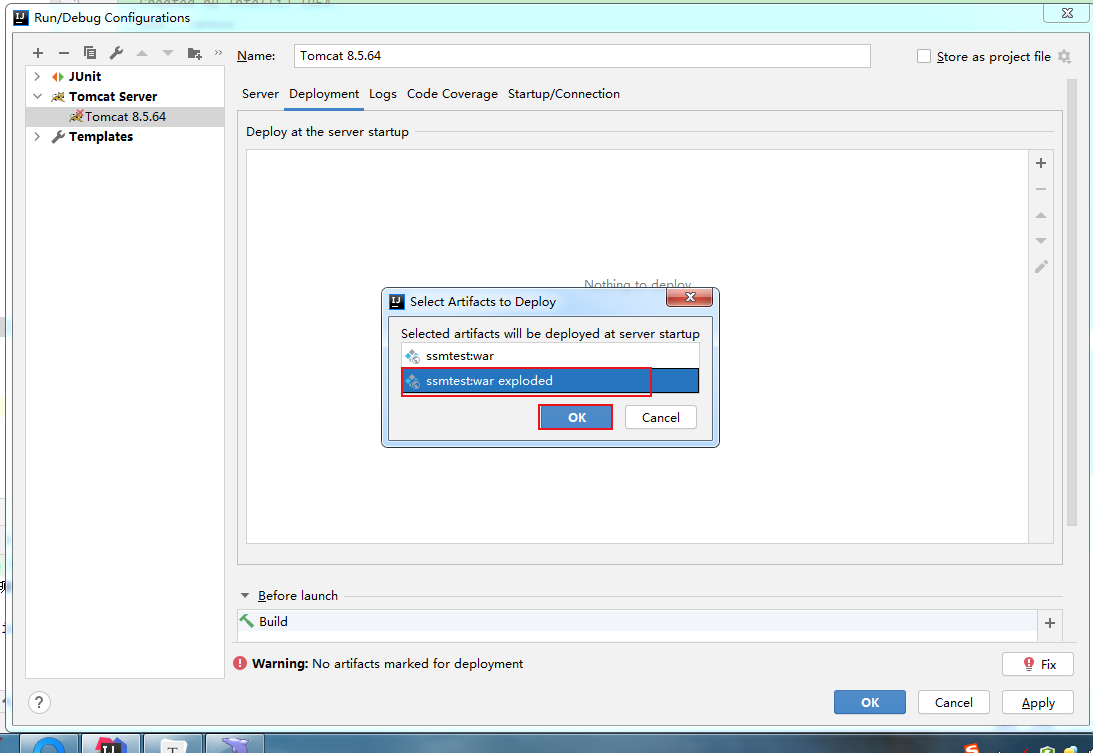
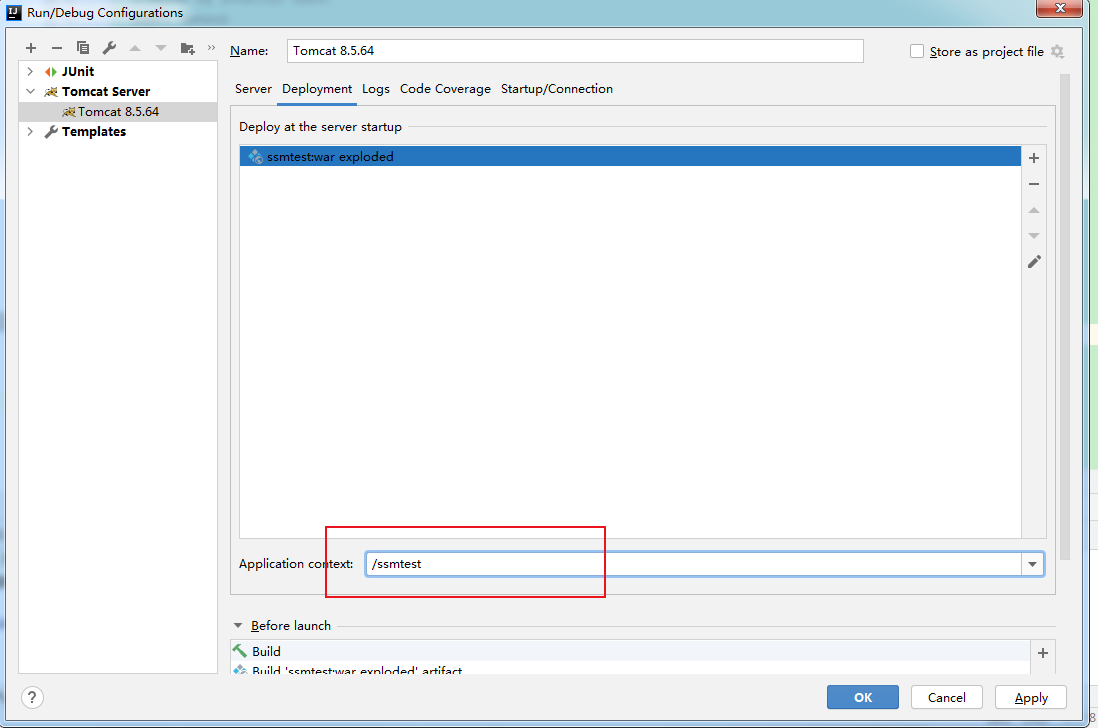
-Dfile.encoding=utf-8
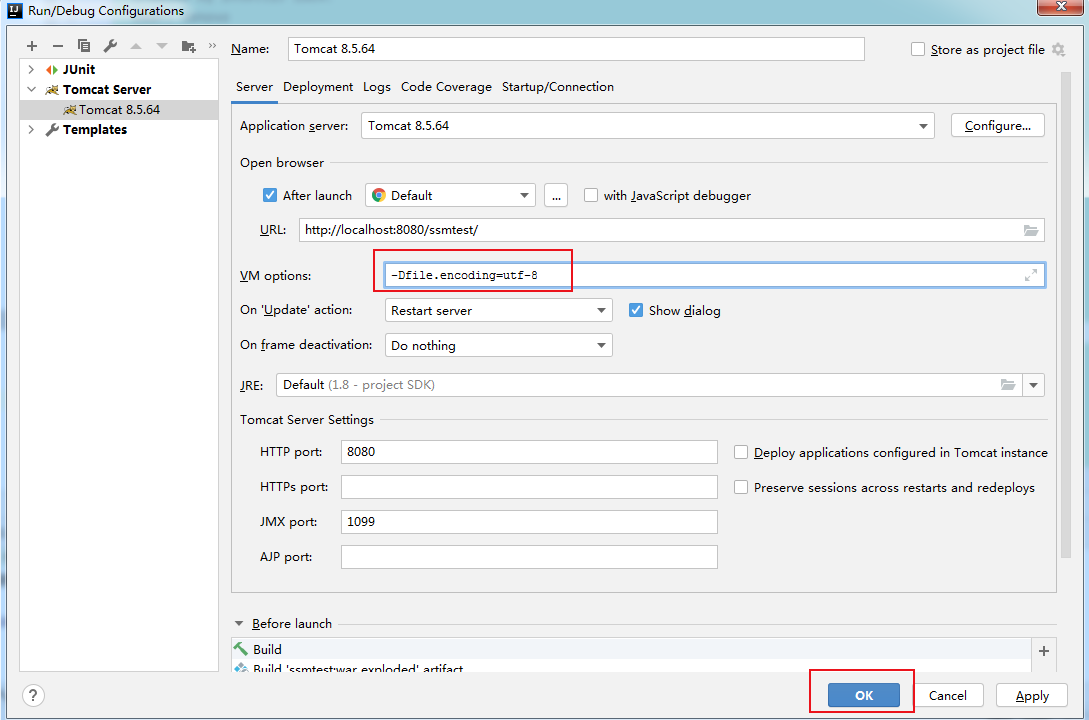
Step 5: start the server and test
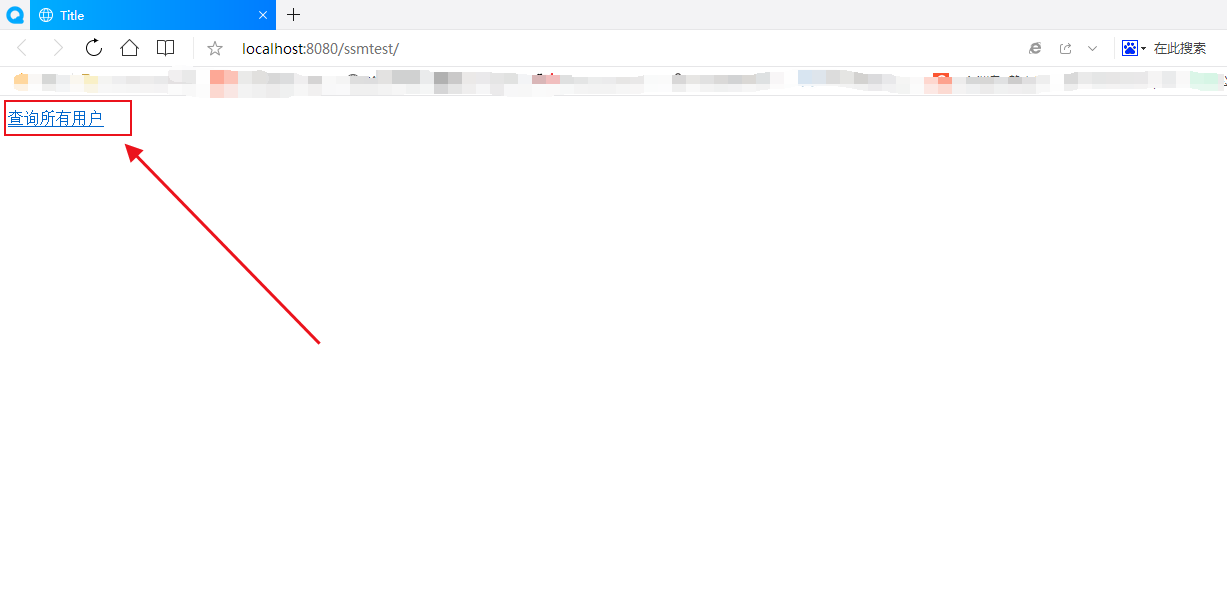
Effect after clicking:
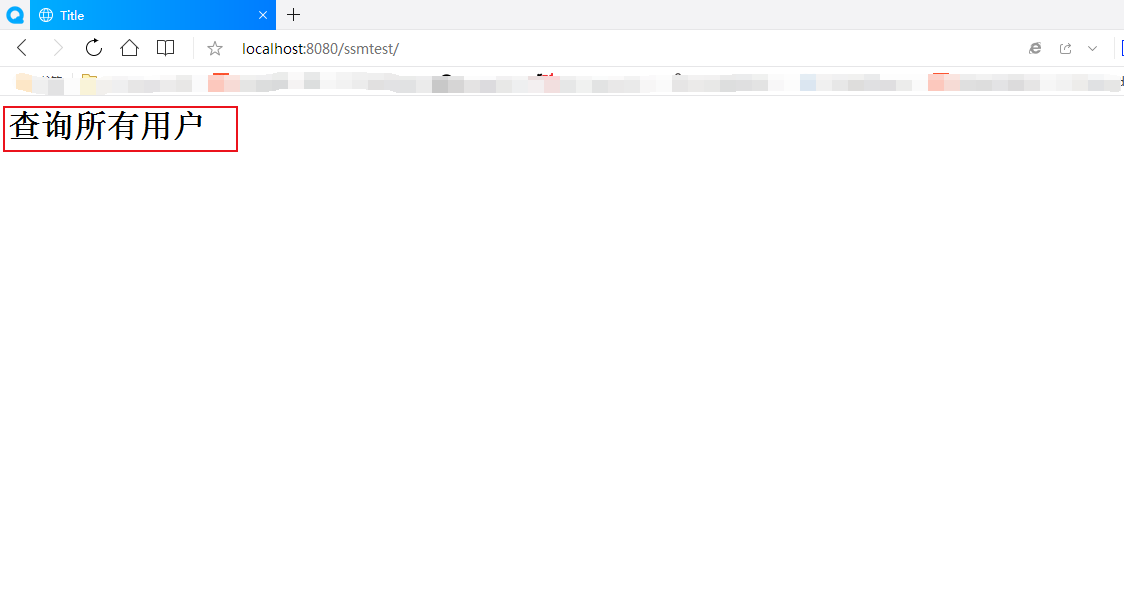
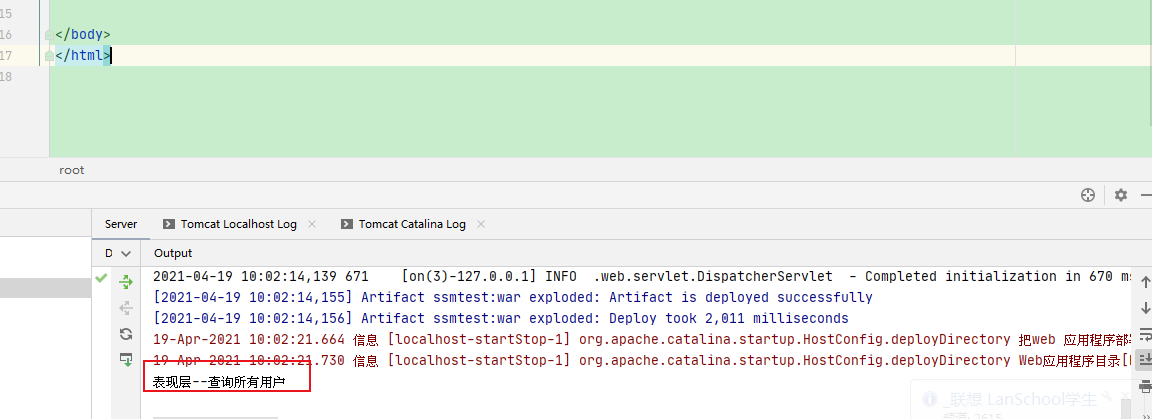
Spring integrates the framework of spring MVC
Step 1: configure the listener to start the service and create the container
<!-- to configure spring Listener provided to load the container when starting the service. This listener can only load WEB-INF The name in the directory is applicationContext.xml Configuration file for --> <listener> <listener-class>org.springframework.web.context.ContextLoaderListener</listener-class> </listener> <!-- Manual assignment spring Profile location --> <context-param> <param-name>contextConfigLocation</param-name> <param-value>classpath:applicationContext.xml</param-value> </context-param>
Complete web xml:
<!DOCTYPE web-app PUBLIC
"-//Sun Microsystems, Inc.//DTD Web Application 2.3//EN"
"http://java.sun.com/dtd/web-app_2_3.dtd" >
<web-app>
<display-name>Archetype Created Web Application</display-name>
<!-- Configure the front-end controller: the server must be loaded when starting, and it needs to be loaded springmvc.xml configuration file -->
<servlet>
<servlet-name>dispatcherServlet</servlet-name>
<servlet-class>org.springframework.web.servlet.DispatcherServlet</servlet-class>
<!-- Configure initialization parameters and load springmvc.xml configuration file -->
<init-param>
<param-name>contextConfigLocation</param-name>
<param-value>classpath:springmvc.xml</param-value>
</init-param>
<!-- Start the server and create the servlet -->
<load-on-startup>1</load-on-startup>
</servlet>
<servlet-mapping>
<servlet-name>dispatcherServlet</servlet-name>
<url-pattern>/</url-pattern>
</servlet-mapping>
<!-- to configure spring Listener provided to load the container when starting the service.
This listener can only load WEB-INF The name in the directory is applicationContext.xml Configuration file for -->
<listener>
<listener-class>org.springframework.web.context.ContextLoaderListener</listener-class>
</listener>
<!-- Manual assignment spring Profile location -->
<context-param>
<param-name>contextConfigLocation</param-name>
<param-value>classpath:applicationContext.xml</param-value>
</context-param>
<!--Filter for solving Chinese garbled code-->
<filter>
<filter-name>characterEncodingFilter</filter-name>
<filter-class>org.springframework.web.filter.CharacterEncodingFilter</filter-class>
<init-param>
<param-name>encoding</param-name>
<param-value>UTF-8</param-value>
</init-param>
</filter>
<filter-mapping>
<filter-name>characterEncodingFilter</filter-name>
<url-pattern>/*</url-pattern>
</filter-mapping>
</web-app>
Step 2: inject the service object into the controller and call the method of the service object to test
UserController :
package com.keafmd.controller;
import com.keafmd.service.IUserService;
import org.springframework.beans.factory.annotation.Autowired;
import org.springframework.stereotype.Controller;
import org.springframework.web.bind.annotation.RequestMapping;
/**
* Keafmd
*
* @ClassName: UserController
* @Description: user Control layer
* @author: Coaxed Conan
* @Date: 2021-04-19 9:28
* @Blog: https://keafmd.blog.csdn.net/
*/
@Controller
@RequestMapping("/user")
public class UserController {
@Autowired
private IUserService userService;
@RequestMapping("/findAll")
public String findAll(){
System.out.println("Presentation layer--Query all users");
//Method of calling service
userService.findAll();
return "user_list";
}
}
Restart Tomcat and click to query all users. The console output effect is as follows:
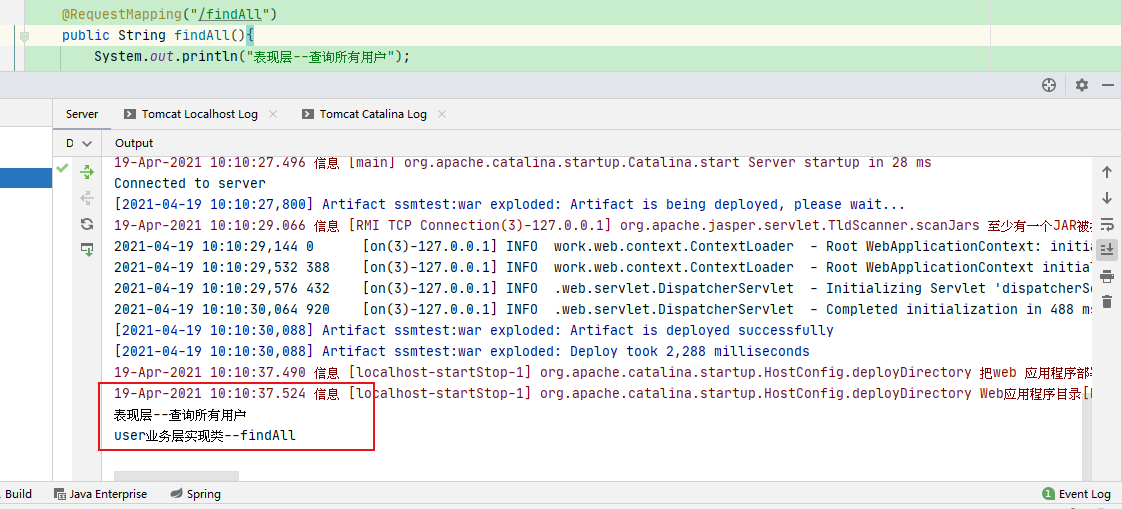
Ensure that MyBatis framework runs independently in web projects
Step 1: write sqlmapconfig. In the web project XML configuration file and write the core configuration file
SqlMapConfig.xml:
<?xml version="1.0" encoding="UTF-8"?>
<!DOCTYPE configuration
PUBLIC "-//mybatis.org//DTD Config 3.0//EN"
"http://mybatis.org/dtd/mybatis-3-config.dtd">
<configuration>
<!-- Configure information for connecting to the database -->
<properties resource="jdbcConfig.properties"></properties>
<!-- to configure mybatis Environment -->
<environments default="mysql">
<environment id="mysql">
<!-- Configure transaction management -->
<transactionManager type="JDBC"></transactionManager>
<dataSource type="pooled">
<property name="driver" value="${jdbc.driver}"/>
<property name="url" value="${jdbc.url}"/>
<property name="username" value="${jdbc.username}"/>
<property name="password" value="${jdbc.password}"/>
</dataSource>
</environment>
</environments>
<!-- Specify mapping file location -->
<mappers>
<!--<mapper class="com.keafmd.dao.IAccountDao"/>
<mapper class="com.keafmd.dao.IUserDao"/>-->
<package name="com.keafmd.dao"/>
</mappers>
</configuration>
jdbcConfig.properties:
jdbc.driver=com.mysql.jdbc.Driver jdbc.url=jdbc:mysql://localhost:3306/ssmtest jdbc.username=root jdbc.password=18044229
Step 2: add annotation on the method of IUserDao interface and write SQL statement
IUserDao :
package com.keafmd.dao;
import com.keafmd.entity.User;
import org.apache.ibatis.annotations.Insert;
import org.apache.ibatis.annotations.Select;
import java.util.List;
/**
* Keafmd
*
* @ClassName: IUserDao
* @Description: User dao interface
* @author: Coaxed Conan
* @Date: 2021-04-19 9:20
* @Blog: https://keafmd.blog.csdn.net/
*/
public interface IUserDao {
//Query all
@Select("select * from user")
public List<User> findAll();
//Save user
@Insert("insert into user(username,password) values(#{userName},#{password})")
public void saveUser(User user);
}
Step 3: write test methods
TestMybatis :
package com.keafmd;
import com.keafmd.dao.IUserDao;
import com.keafmd.entity.User;
import org.apache.ibatis.io.Resources;
import org.apache.ibatis.session.SqlSession;
import org.apache.ibatis.session.SqlSessionFactory;
import org.apache.ibatis.session.SqlSessionFactoryBuilder;
import org.junit.After;
import org.junit.Before;
import org.junit.Test;
import java.io.InputStream;
import java.util.List;
/**
* Keafmd
*
* @ClassName: TestMybatis
* @Description:
* @author: Coaxed Conan
* @Date: 2021-04-19 10:20
* @Blog: https://keafmd.blog.csdn.net/
*/
public class TestMybatis {
private InputStream in;
private SqlSessionFactory factory;
private SqlSession session;
private IUserDao userDao;
@Before
public void init() throws Exception{
//Load profile
in = Resources.getResourceAsStream("SqlMapConfig.xml");
//Create SqlSessionFactory object
factory = new SqlSessionFactoryBuilder().build(in);
//Create SqlSession object
session = factory.openSession();
//Get proxy object
userDao = session.getMapper(IUserDao.class);
}
@After
public void destory() throws Exception{
session.commit();
session.close();
in.close();
}
/**
* Query all
*/
@Test
public void run1(){
List<User> users = userDao.findAll();
for (User user : users) {
System.out.println(user);
}
}
/**
* Test save
*/
@Test
public void saveUser(){
User user = new User();
user.setUserName("Maori Kogoro");
user.setPassword("999");
userDao.saveUser(user);
}
}
Test effect:
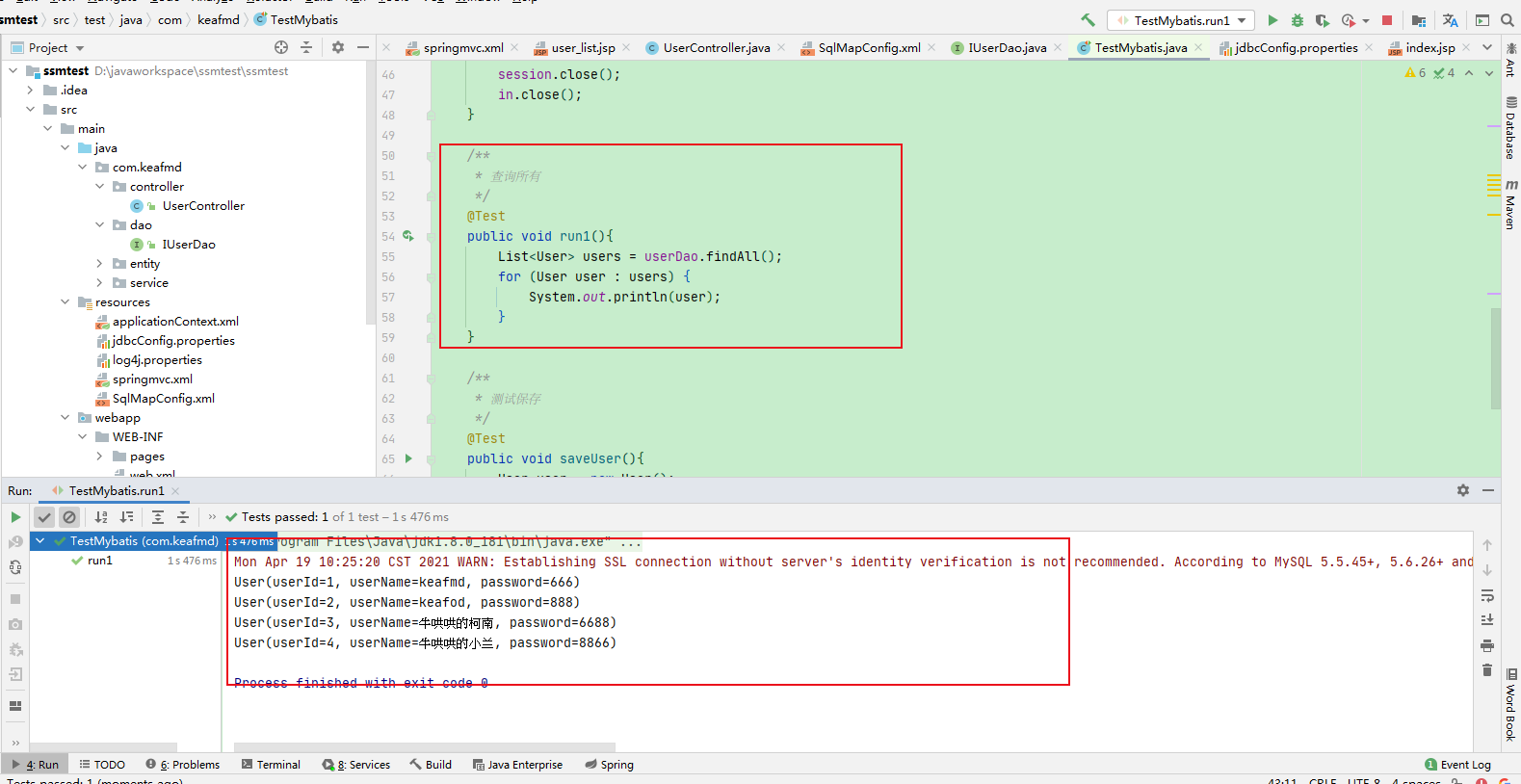
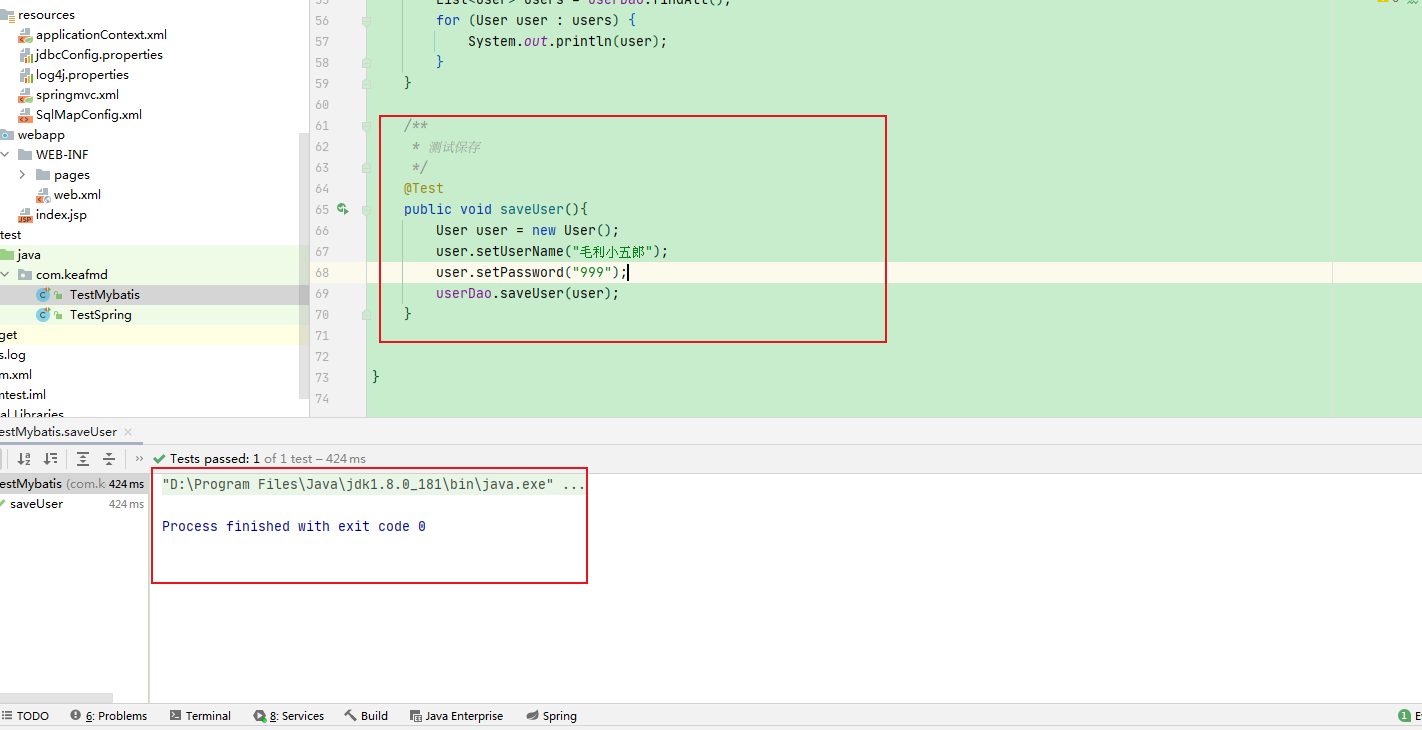
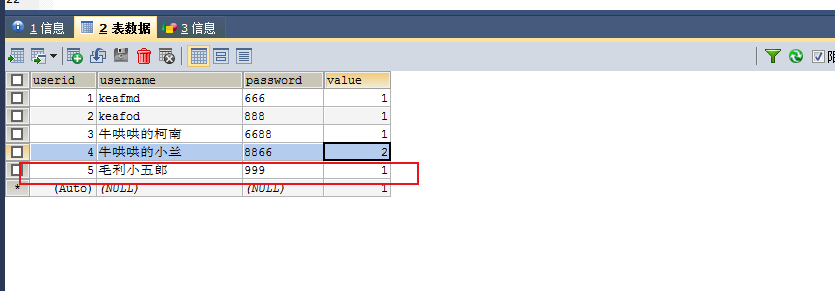
Spring integrates MyBatis framework
Configure the contents of the mybatis configuration file (SqlMapConfig.xml) into the spring configuration file, and clear the contents of the mybatis configuration file at the same time.
Step 1: put sqlmapconfig Configure the content in the XML configuration file to ApplicationContext XML configuration file
Add the following to ApplicationContext XML configuration file:
<!--Spring integration Mybatisl frame-->
<!-- to configure C3P0 Connection pool object for -->
<bean id="dataSource" class="com.mchange.v2.c3p0.ComboPooledDataSource">
<property name="driverClass" value="com.mysql.jdbc.Driver"/>
<property name="jdbcUrl" value="jdbc:mysql:///ssmtest"/>
<property name="user" value="root"/>
<property name="password" value="18044229"/>
</bean>
<!-- to configure SqlSession Factory -->
<bean id="sqlSessionFactory" class="org.mybatis.spring.SqlSessionFactoryBean">
<property name="dataSource" ref="dataSource"/>
</bean>
<!-- Configure scan dao My bag -->
<bean id="mapperScanner" class="org.mybatis.spring.mapper.MapperScannerConfigurer">
<property name="basePackage" value="com.keafmd.dao"/>
</bean>
<!--SqlMapConfig.xml and jdbcConfig.properties It can be deleted-->
Add and configure the Spring framework declarative transaction management:
<!--to configure Spring Framework declarative transaction management-->
<!--Configure transaction manager-->
<bean id="transactionManager" class="org.springframework.jdbc.datasource.DataSourceTransactionManager">
<property name="dataSource" ref="dataSource"></property>
</bean>
<!-- Configure notifications for transactions -->
<tx:advice id="txAdvice" transaction-manager="transactionManager">
<tx:attributes>
<tx:method name="find*" propagation="SUPPORTS" read-only="true"/>
<tx:method name="*" isolation="DEFAULT"/>
</tx:attributes>
</tx:advice>
<!-- to configure AOP enhance -->
<aop:config>
<!--<aop:advisor advice-ref="txAdvice" pointcut="execution(* com.keafmd.service.impl.*.*(..))"/>-->
<!-- Configure pointcut expressions -->
<aop:pointcut expression="execution(* com.keafmd.service.impl.*.*(..))" id="pt1"/>
<!-- Establish the relationship between notification and pointcut expression -->
<aop:advisor advice-ref="txAdvice" pointcut-ref="pt1"/>
</aop:config>
applicationContext.xml:
<?xml version="1.0" encoding="UTF-8"?>
<beans xmlns="http://www.springframework.org/schema/beans"
xmlns:xsi="http://www.w3.org/2001/XMLSchema-instance"
xmlns:context="http://www.springframework.org/schema/context"
xmlns:aop="http://www.springframework.org/schema/aop" xmlns:tx="http://www.springframework.org/schema/tx"
xsi:schemaLocation="http://www.springframework.org/schema/beans
http://www.springframework.org/schema/beans/spring-beans.xsd
http://www.springframework.org/schema/context
http://www.springframework.org/schema/context/spring-context.xsd
http://www.springframework.org/schema/aop
http://www.springframework.org/schema/aop/spring-aop.xsd
http://www.springframework.org/schema/tx
http://www.springframework.org/schema/tx/spring-tx.xsd">
<!-- Start annotation scanning. What to scan is service and dao The annotation of the layer should be ignored web Layer annotation, because web Layer let SpringMVC Framework to manage -->
<context:component-scan base-package="com.keafmd">
<!-- Configuration of annotations to ignore -->
<context:exclude-filter type="annotation" expression="org.springframework.stereotype.Controller"/>
</context:component-scan>
<!--Spring integration Mybatisl frame-->
<!-- to configure C3P0 Connection pool object for -->
<bean id="dataSource" class="com.mchange.v2.c3p0.ComboPooledDataSource">
<property name="driverClass" value="com.mysql.jdbc.Driver"/>
<property name="jdbcUrl" value="jdbc:mysql:///ssmtest?characterEncoding=utf8"/>
<property name="user" value="root"/>
<property name="password" value="root"/>
</bean>
<!-- to configure SqlSession Factory -->
<bean id="sqlSessionFactory" class="org.mybatis.spring.SqlSessionFactoryBean">
<property name="dataSource" ref="dataSource"/>
</bean>
<!-- Configure scan dao My bag -->
<bean id="mapperScanner" class="org.mybatis.spring.mapper.MapperScannerConfigurer">
<property name="basePackage" value="com.keafmd.dao"/>
</bean>
<!--SqlMapConfig.xml and jdbcConfig.properties It can be deleted-->
<!--to configure Spring Framework declarative transaction management-->
<!--Configure transaction manager-->
<bean id="transactionManager" class="org.springframework.jdbc.datasource.DataSourceTransactionManager">
<property name="dataSource" ref="dataSource"></property>
</bean>
<!-- Configure notifications for transactions -->
<tx:advice id="txAdvice" transaction-manager="transactionManager">
<tx:attributes>
<tx:method name="find*" propagation="SUPPORTS" read-only="true"/>
<tx:method name="*" isolation="DEFAULT"/>
</tx:attributes>
</tx:advice>
<!-- to configure AOP enhance -->
<aop:config>
<!--<aop:advisor advice-ref="txAdvice" pointcut="execution(* com.keafmd.service.impl.*.*(..))"/>-->
<!-- Configure pointcut expressions -->
<aop:pointcut expression="execution(* com.keafmd.service.impl.*.*(..))" id="pt1"/>
<!-- Establish the relationship between notification and pointcut expression -->
<aop:advisor advice-ref="txAdvice" pointcut-ref="pt1"/>
</aop:config>
</beans>
Step 3: add @ Repository annotation in IUserDao interface
package com.keafmd.dao;
import com.keafmd.entity.User;
import org.apache.ibatis.annotations.Insert;
import org.apache.ibatis.annotations.Result;
import org.apache.ibatis.annotations.Results;
import org.apache.ibatis.annotations.Select;
import org.springframework.stereotype.Repository;
import java.util.List;
/**
* Keafmd
*
* @ClassName: IUserDao
* @Description: User dao interface
* @author: Coaxed Conan
* @Date: 2021-04-19 9:20
* @Blog: https://keafmd.blog.csdn.net/
*/
@Repository
public interface IUserDao {
//Query all
@Select("select * from user")
public List<User> findAll();
//Save user
@Insert("insert into user(username,password) values(#{userName},#{password})")
public void saveUser(User user);
}
Step 4: inject dao object into UserServiceImpl
package com.keafmd.service.impl;
import com.keafmd.dao.IUserDao;
import com.keafmd.entity.User;
import com.keafmd.service.IUserService;
import org.springframework.beans.factory.annotation.Autowired;
import org.springframework.stereotype.Service;
import java.util.List;
/**
* Keafmd
*
* @ClassName: UserService
* @Description: user Business layer implementation class
* @author: Coaxed Conan
* @Date: 2021-04-19 9:25
* @Blog: https://keafmd.blog.csdn.net/
*/
@Service("userService")
public class UserServiceImpl implements IUserService {
@Autowired
IUserDao userDao;
@Override
public List<User> findAll() {
System.out.println("user Business layer implementation class--findAll");
return userDao.findAll();
}
@Override
public void saveUser(User user) {
System.out.println("user Business layer implementation class--saveUser");
userDao.saveUser(user);
}
}
Step 5: modify the UserController code
package com.keafmd.controller;
import com.keafmd.entity.User;
import com.keafmd.service.IUserService;
import org.springframework.beans.factory.annotation.Autowired;
import org.springframework.http.HttpRequest;
import org.springframework.stereotype.Controller;
import org.springframework.ui.Model;
import org.springframework.web.bind.annotation.RequestMapping;
import javax.servlet.http.HttpServletRequest;
import javax.servlet.http.HttpServletResponse;
import java.io.IOException;
import java.util.List;
/**
* Keafmd
*
* @ClassName: UserController
* @Description: user Control layer
* @author: Coaxed Conan
* @Date: 2021-04-19 9:28
* @Blog: https://keafmd.blog.csdn.net/
*/
@Controller
@RequestMapping("/user")
public class UserController {
@Autowired
private IUserService userService;
@RequestMapping("/findAll")
public String findAll(Model model){
System.out.println("Presentation layer--Query all users");
//Method of calling service
List<User> userList = userService.findAll();
model.addAttribute("userList",userList);
return "user_list";
}
@RequestMapping("/save")
public void save(User user , HttpServletRequest request, HttpServletResponse response) throws IOException {
userService.saveUser(user);
response.sendRedirect(request.getContextPath()+"/user/findAll");
return;
}
}
Step 5: modify user_list.jsp code to display account information
<%--
Created by IntelliJ IDEA.
User: lenovo
Date: 2021/4/19
Time: 9:55
To change this template use File | Settings | File Templates.
--%>
<%@ page contentType="text/html;charset=UTF-8" language="java" isELIgnored="false" %>
<%@taglib prefix="c" uri="http://java.sun.com/jsp/jstl/core" %>
<html>
<head>
<title>Title</title>
</head>
<body>
<h1>Query all users</h1>
<%-- ${userList}--%>
<c:forEach items="${userList}" var="user">
${user.userName}
${user.password}
</c:forEach>
</body>
</html>
Step 6: test query
effect:
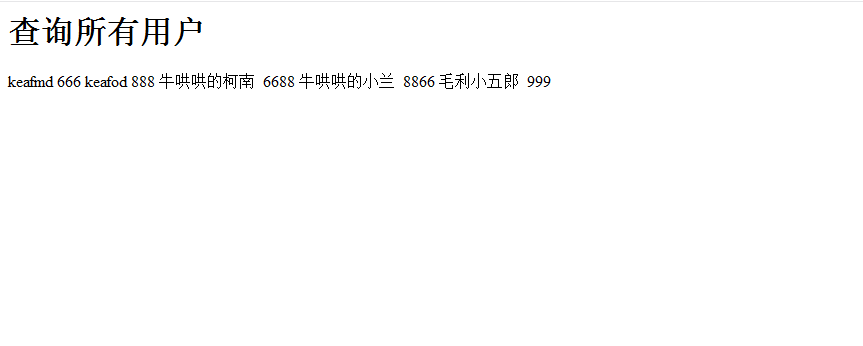
Step 7: Test save
Modify index Jsp code, add the code saved by the test:
<%--
Created by IntelliJ IDEA.
User: lenovo
Date: 2021/4/19
Time: 9:52
To change this template use File | Settings | File Templates.
--%>
<%@ page contentType="text/html;charset=UTF-8" language="java" %>
<html>
<head>
<title>Title</title>
</head>
<body>
<a href="user/findAll">Query all users</a>
<h1>Test save</h1>
<form action="user/save" method="post">
Account Name:<input type="text" name="userName" /><br/>
password:<input type="text" name="password" /><br/>
<input type="submit" value="preservation">
</form>
</body>
</html>
Modify the UserController code and add the save method:
package com.keafmd.controller;
import com.keafmd.entity.User;
import com.keafmd.service.IUserService;
import org.springframework.beans.factory.annotation.Autowired;
import org.springframework.http.HttpRequest;
import org.springframework.stereotype.Controller;
import org.springframework.ui.Model;
import org.springframework.web.bind.annotation.RequestMapping;
import javax.servlet.http.HttpServletRequest;
import javax.servlet.http.HttpServletResponse;
import java.io.IOException;
import java.util.List;
/**
* Keafmd
*
* @ClassName: UserController
* @Description: user Control layer
* @author: Coaxed Conan
* @Date: 2021-04-19 9:28
* @Blog: https://keafmd.blog.csdn.net/
*/
@Controller
@RequestMapping("/user")
public class UserController {
@Autowired
private IUserService userService;
@RequestMapping("/findAll")
public String findAll(Model model){
System.out.println("Presentation layer--Query all users");
//Method of calling service
List<User> userList = userService.findAll();
model.addAttribute("userList",userList);
return "user_list";
}
@RequestMapping("/save")
public void save(User user , HttpServletRequest request, HttpServletResponse response) throws IOException {
userService.saveUser(user);
response.sendRedirect(request.getContextPath()+"/user/findAll");
return;
}
}
Test effect:
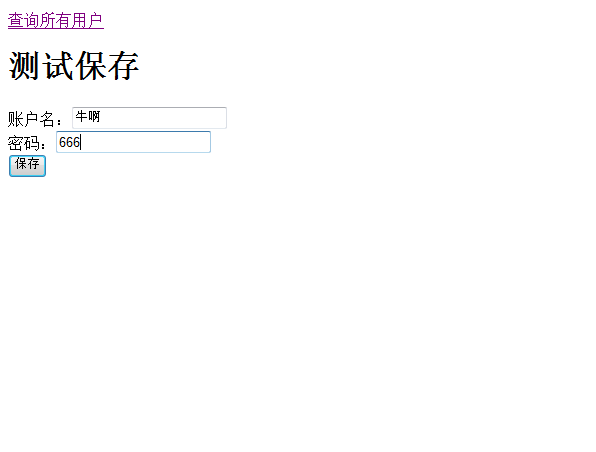
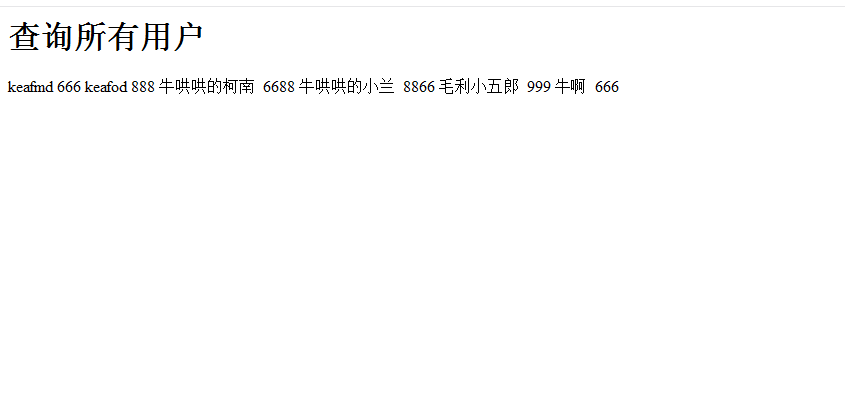
Addition, deletion, modification and query (separation of front and rear ends)
lookup
In actual development, the front and back ends are mostly separated, so we need to modify our presentation layer code and add jackson's dependency.
<dependency> <groupId>com.fasterxml.jackson.core</groupId> <artifactId>jackson-core</artifactId> <version>2.11.0</version> </dependency> <dependency> <groupId>com.fasterxml.jackson.core</groupId> <artifactId>jackson-databind</artifactId> <version>2.11.0</version> </dependency> <dependency> <groupId>com.fasterxml.jackson.core</groupId> <artifactId>jackson-annotations</artifactId> <version>2.11.0</version> </dependency>
UserController:
package com.keafmd.controller;
import com.keafmd.common.CommonResult;
import com.keafmd.entity.User;
import com.keafmd.service.IUserService;
import org.springframework.beans.factory.annotation.Autowired;
import org.springframework.http.HttpRequest;
import org.springframework.stereotype.Controller;
import org.springframework.ui.Model;
import org.springframework.web.bind.annotation.RequestMapping;
import org.springframework.web.bind.annotation.ResponseBody;
import javax.servlet.http.HttpServletRequest;
import javax.servlet.http.HttpServletResponse;
import java.io.IOException;
import java.util.List;
/**
* Keafmd
*
* @ClassName: UserController
* @Description: user Control layer
* @author: Coaxed Conan
* @Date: 2021-04-19 9:28
* @Blog: https://keafmd.blog.csdn.net/
*/
@Controller
@RequestMapping("/user")
public class UserController {
@Autowired
private IUserService userService;
// http://127.0.0.1:8080/ssmtest/user/findAll
@RequestMapping("/findAll")
@ResponseBody
public List<User> findAll(){
System.out.println("Presentation layer--Query all users");
//Method of calling service
List<User> userList = userService.findAll();
// model.addAttribute("userList",userList);
// return "user_list";
return userList;
}
@RequestMapping("/save")
public void save(User user , HttpServletRequest request, HttpServletResponse response) throws IOException {
userService.saveUser(user);
response.sendRedirect(request.getContextPath()+"/user/findAll");
return;
}
}
visit: http://127.0.0.1:8080/ssmtest/user/findAll
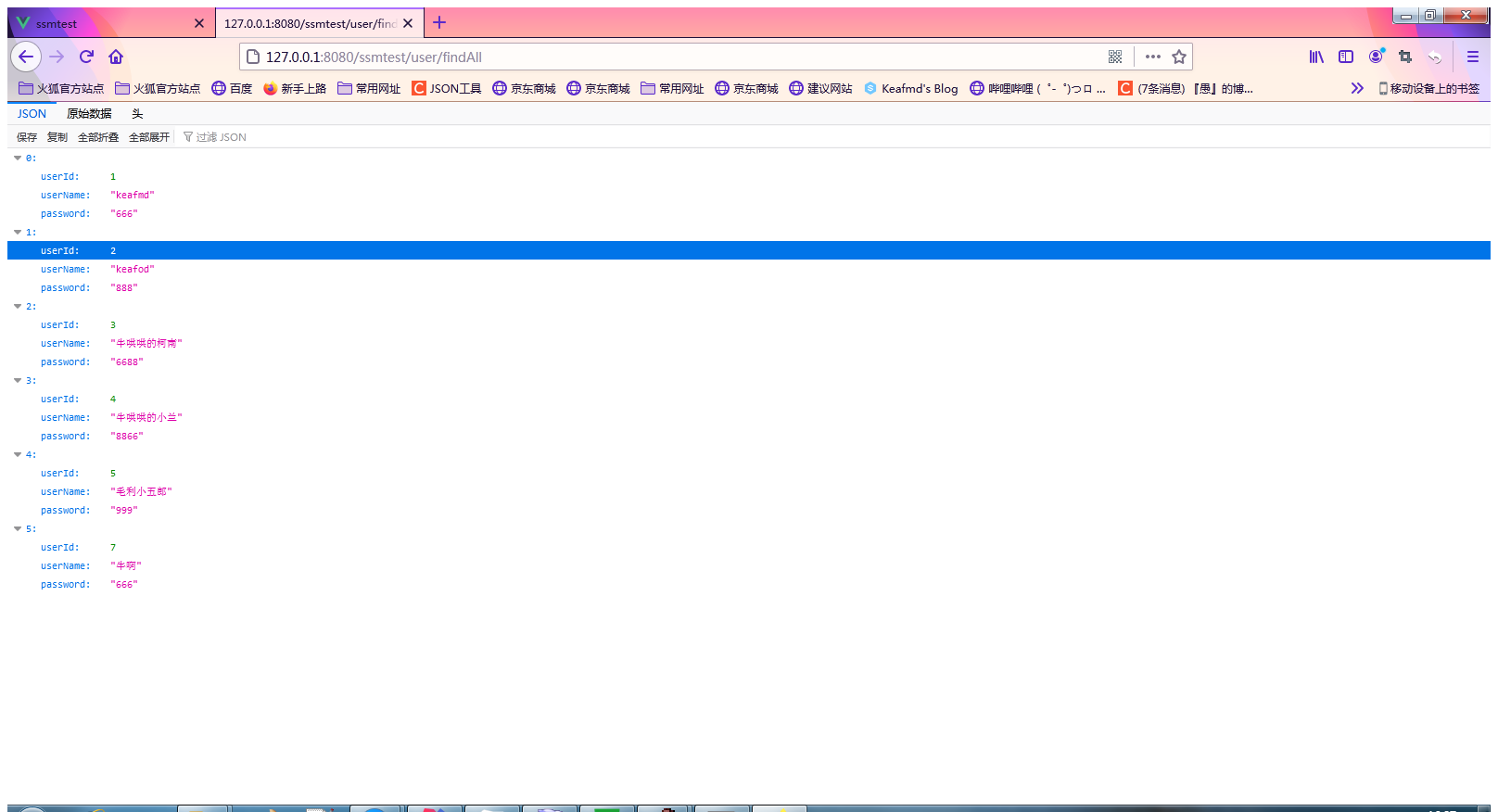
Front end vue project
We need to have relevant environment here. I won't elaborate here.
Create an empty vue item
Find a folder, enter the command line, and enter: vue create ssmtest
Close the code format verification tool
In the root directory of the project (the same level as package.json), add the name Vue. JSON config. JS files can be automatically loaded by Vue cli.
module.exports = {
lintOnSave:false, //Close the code format verification tool
devServer:{
port: 80 //Modify boot port
}
}
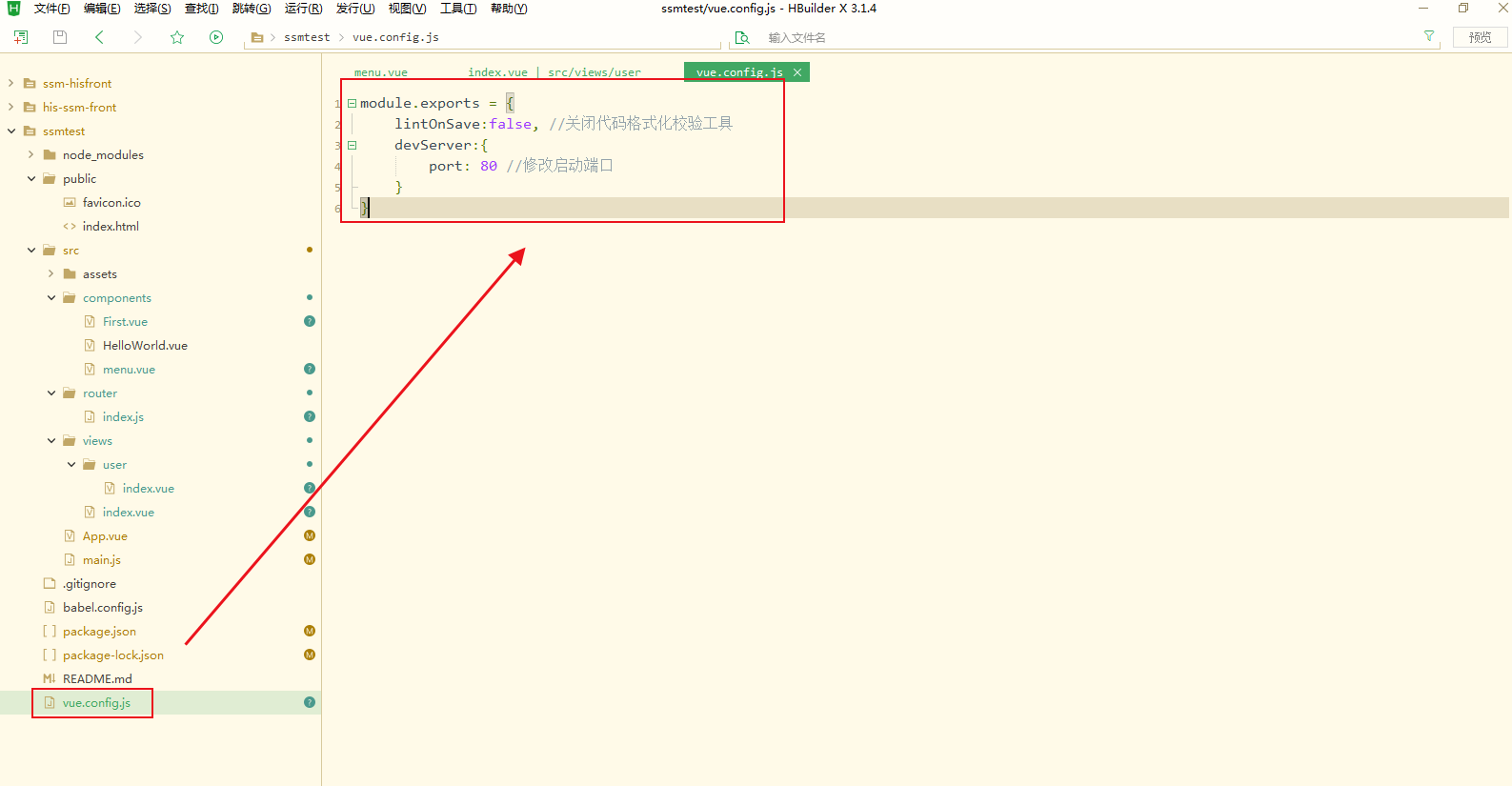
Install related tools
1. Installing Vue router
npm install vue-router
2. Installing the element UI plug-in
npm i element-ui -S
3. Install axios
npm install axios
directory structure
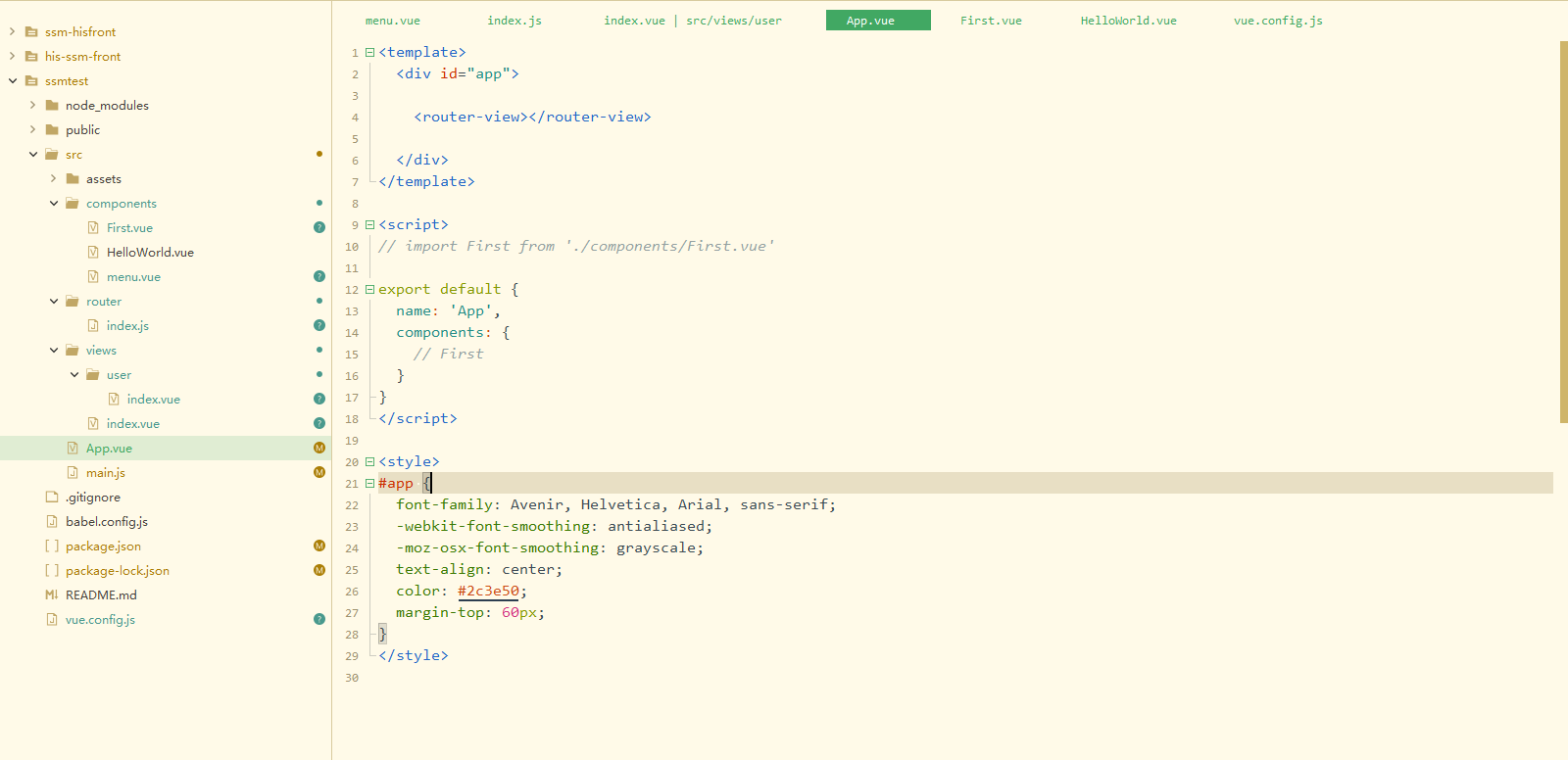
Write main js
Introduce various components here and write router.
import Vue from 'vue'
import App from './App.vue'
import router from '@/router'
import ElementUI from 'element-ui';
import 'element-ui/lib/theme-chalk/index.css';
Vue.use(ElementUI);
Vue.config.productionTip = false
new Vue({
render: h => h(App),
router
}).$mount('#app')
Write app vue
Write < router View > < / router View > in div and use the routing control interface.
<template>
<div id="app">
<router-view></router-view>
</div>
</template>
<script>
// import First from './components/First.vue'
export default {
name: 'App',
components: {
// First
}
}
</script>
<style>
#app {
font-family: Avenir, Helvetica, Arial, sans-serif;
-webkit-font-smoothing: antialiased;
-moz-osx-font-smoothing: grayscale;
text-align: center;
color: #2c3e50;
margin-top: 60px;
}
</style>
Write index. In router folder js
Here, use router to configure various paths
import Vue from 'vue'
import Router from 'vue-router'
Vue.use(Router)
// import A from '@/components/A'
// import B from '@/components/B'
export default new Router({
mode: 'history',
routes: [{
path: '/',
name: 'Index',
component: () => import('@/views'),
children: [{
path: '/user',
name: 'User',
component: () => import('@/views/user')
}
]
}
// ,
// {
// path: '/user',
// name: 'User',
// component: () => import('@/views/user')
// }
// {
// path: '/aaa',
// name: 'A',
// component: A
// },
// {
// path: '/bbb',
// name: 'B',
// component: B
// }
]
})
Write the menu of the public part vue
Note: insert router into the El menu tag.
<template>
<el-menu router >
<el-submenu index="1">
<template slot="title">
<span>Administration</span>
</template>
<el-menu-item-group>
<el-menu-item index="/user"> <i class="el-icon-location"></i>user management </el-menu-item>
<!-- <el-menu-item index="/menu"> <i class="el-icon-location"></i>Menu management</el-menu-item> -->
</el-menu-item-group>
</el-submenu>
<!-- <el-submenu index="2">
<template slot="title">
<span>ElementUI assembly</span>
</template>
<el-menu-item-group>
<el-menu-item index="/table"> <i class="el-icon-location"></i>Table component</el-menu-item>
</el-menu-item-group>
</el-submenu> -->
</el-menu>
</template>
<script>
export default {
name: 'Menu'
}
</script>
<style>
</style>
Write index. Under views vue
<template>
<el-container class="wrap">
<el-header class="header">
<el-row>
<el-col :span="20">information system</el-col>
<el-col :span="4">
<el-dropdown>
<span class="el-dropdown-link">
keafmd<i class="el-icon-arrow-down el-icon--right"></i>
</span>
<el-dropdown-menu slot="dropdown">
<el-dropdown-item command="Personal">Personal settings</el-dropdown-item>
<el-dropdown-item command="Logout">sign out</el-dropdown-item>
</el-dropdown-menu>
</el-dropdown>
</el-col>
</el-row>
</el-header>
<el-container>
<el-aside width="200px" class="aside">
<Menu></Menu>
</el-aside>
<el-main>
<!-- <User></User> -->
<router-view></router-view>
</el-main>
</el-container>
</el-container>
</template>
<script>
// import User from './user/index.vue'
import Menu from '@/components/menu'
export default {
name: 'Index',
components: {
Menu
// User
},
data() {
return {}
},
methods: {
},
created() {}
}
</script>
<style scoped>
.wrap {
height: 100vh;
}
.header {
border-bottom: 1px solid aqua;
}
.aside {
border-right: 1px solid aqua;
}
</style>
Write the index under user under views vue
<template>
<div>
<el-table :data="tableData.filter(data => !search || data.name.toLowerCase().includes(search.toLowerCase()))"
style="width: 100%">
<el-table-column label="userName" prop="userName">
</el-table-column>
<el-table-column label="Password" prop="password">
</el-table-column>
<el-table-column align="right">
<template slot="header" slot-scope="scope">
<el-input v-model="search" size="mini" placeholder="Enter keyword search" />
</template>
<template slot-scope="scope">
<el-button size="mini" @click="handleEdit(scope.$index, scope.row)">Edit</el-button>
<el-button size="mini" type="danger" @click="handleDelete(scope.$index, scope.row)">Delete
</el-button>
</template>
</el-table-column>
</el-table>
</div>
</template>
<script>
import axios from 'axios';
axios.defaults.baseURL = 'http://127.0.0.1:8080/ssmtest';
export default {
name: 'User',
components: {
},
data() {
return {
tableData: [],
search: ''
}
},
methods: {
getData() {
axios.get('/user/findAll')
.then((res) => {
this.tableData = res.data
})
.catch(function(error) {
console.log(error);
});
},
handleEdit(index, row) {
console.log(index, row);
},
handleDelete(index, row) {
console.log(index, row);
}
},
created() {
this.getData();
}
}
</script>
<style>
</style>
Effect display
Query effect:
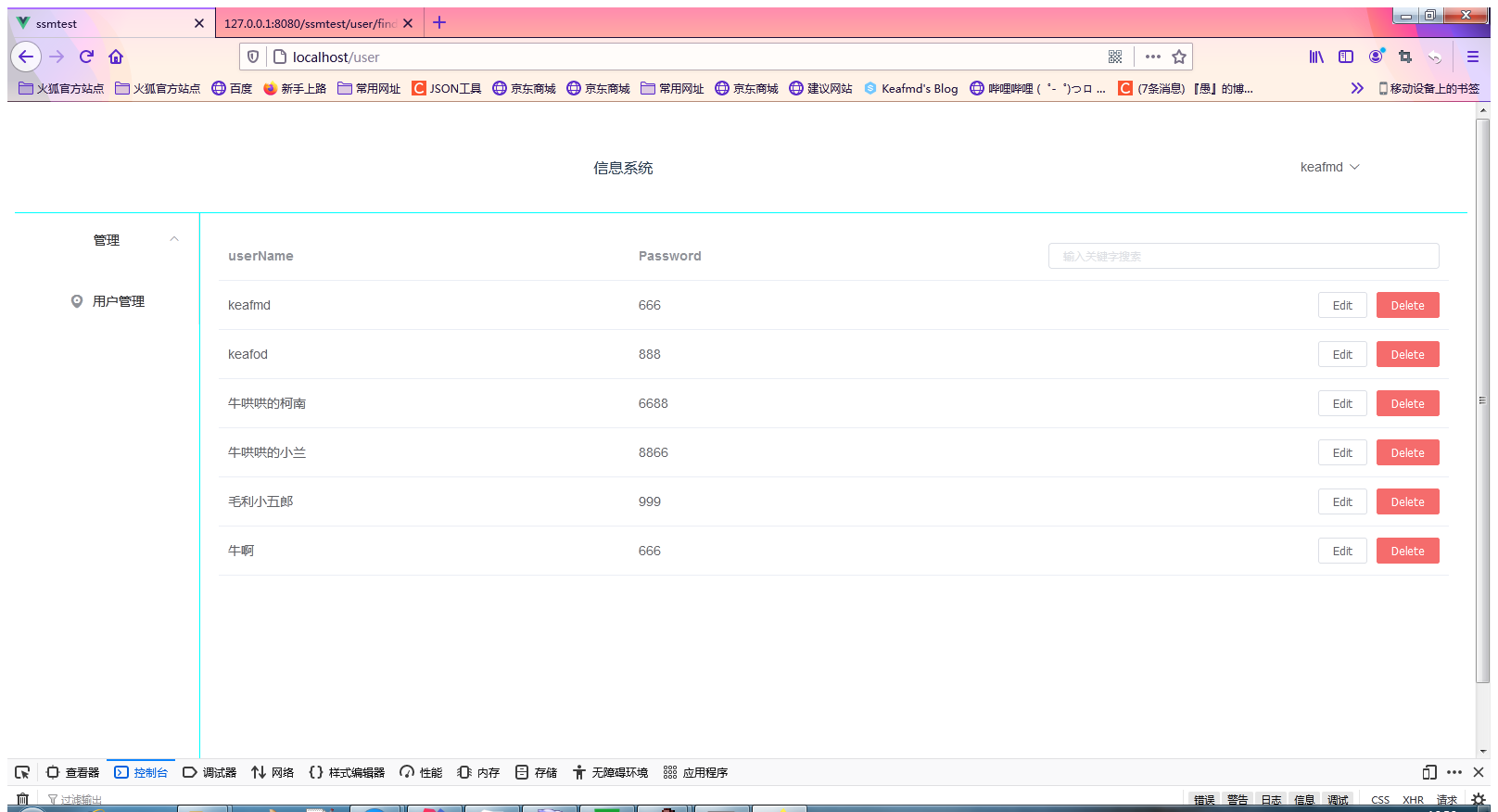
After reading, if it helps you, thank you for your praise and support!
If you are a computer terminal, do you see the "one key three links" in the lower right corner? Yes, click it [HA HA]

come on.
make joint efforts!
Keafmd